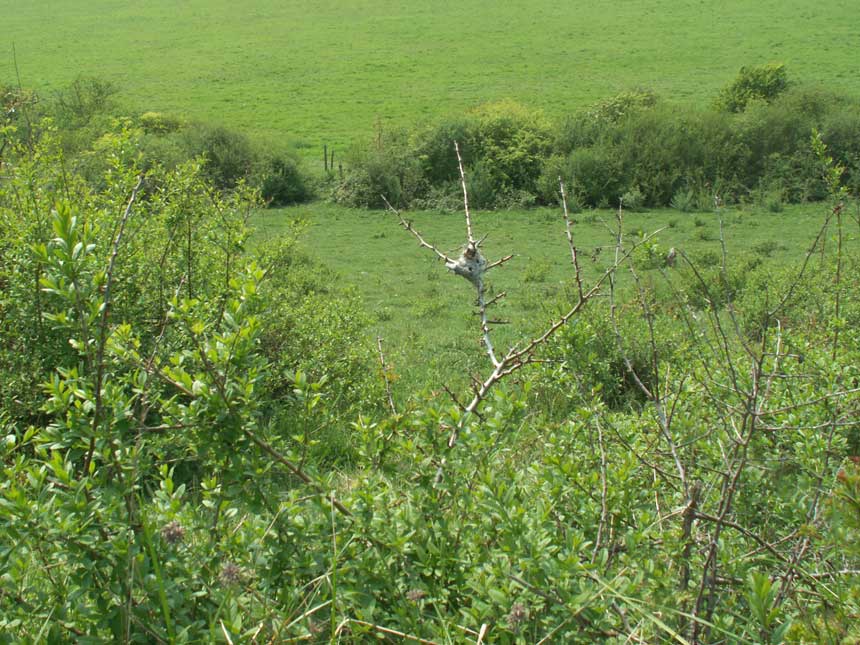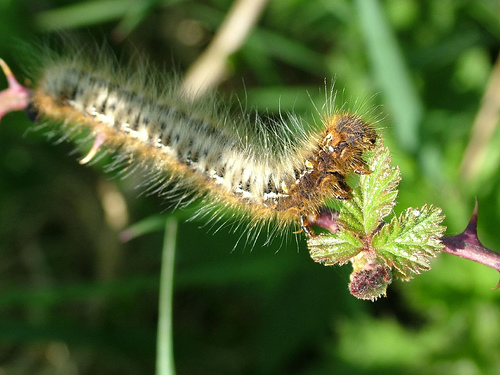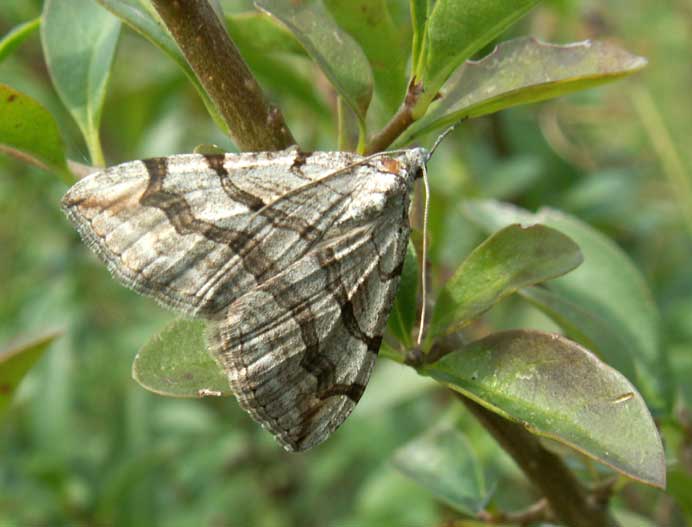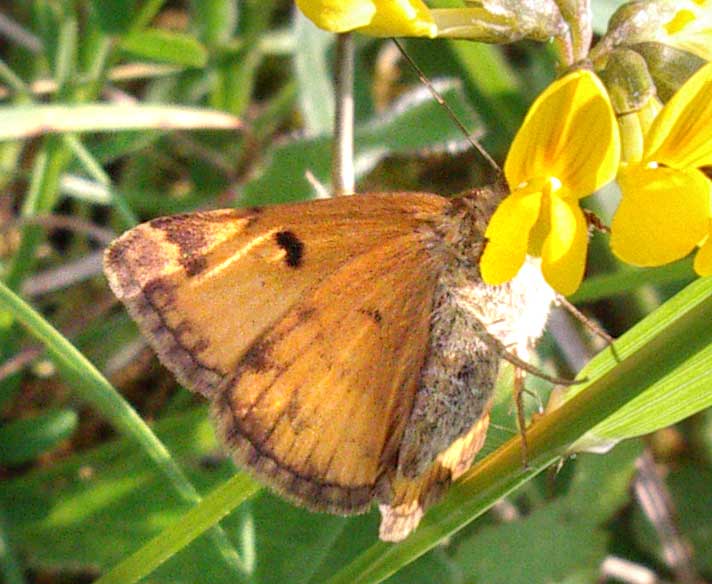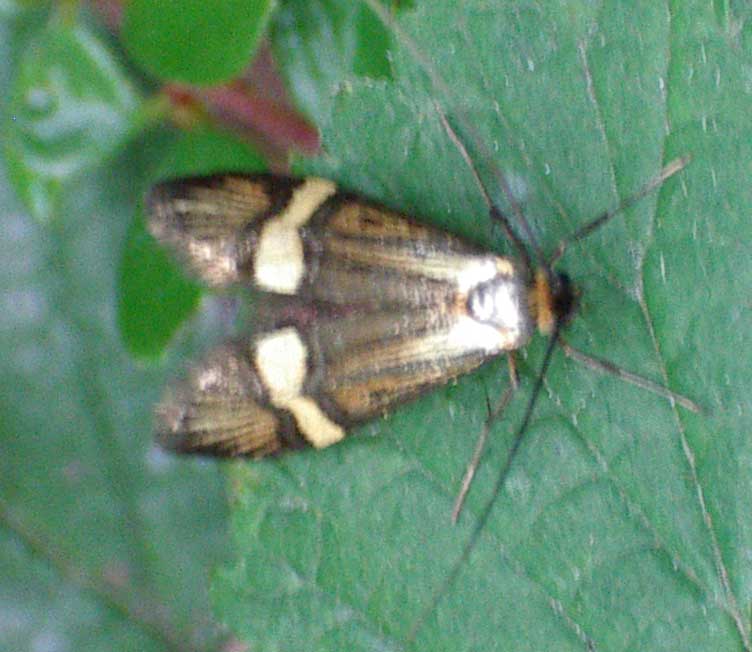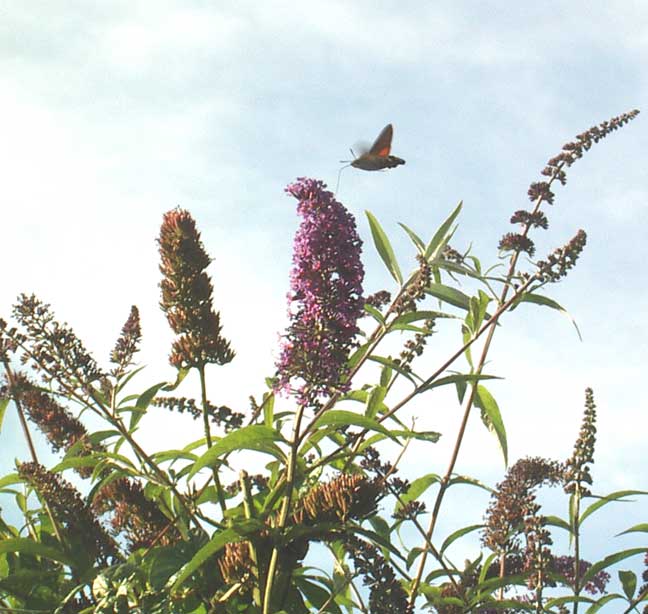-
Adur Moths
-
Miscellaneous selection of
mostly (diurnal) day-flyers or very common species or large ones disturbed
during the day or caught indoors
-
Sussex
Moth Group Sightings
-
Adur
Burnet Moths
-
2022
| 29
June 2022
Cinnabar
Moth
at
Downs Link near the Cement Works |
.jpg) |
26
June 2022
3 June
2022
Two
Cinnabar Moths fluttered over the
hedge-lined Mill Hill Road north
of the bridge over the A27
dual carriageway.
2021
12
July 2021

Plume Moth
11
May 2021
My
first Brimstone Moth, Opisthograptis
luteolata, of the year fluttered
around Northbourne Medical Centre.
2020
17
August 2020
A
Plumed
Fanfoot Moth, Pechipogo
plumigeralis, rested in my lounge all day.

Moths
Indoors
Plumed
Fanfoot Moth
Bright-line
Brown-eye Moth, Lacanobia oleracea.
Riband
Wave, Idaea
aversata
ab. remutata
.
8
August 2020
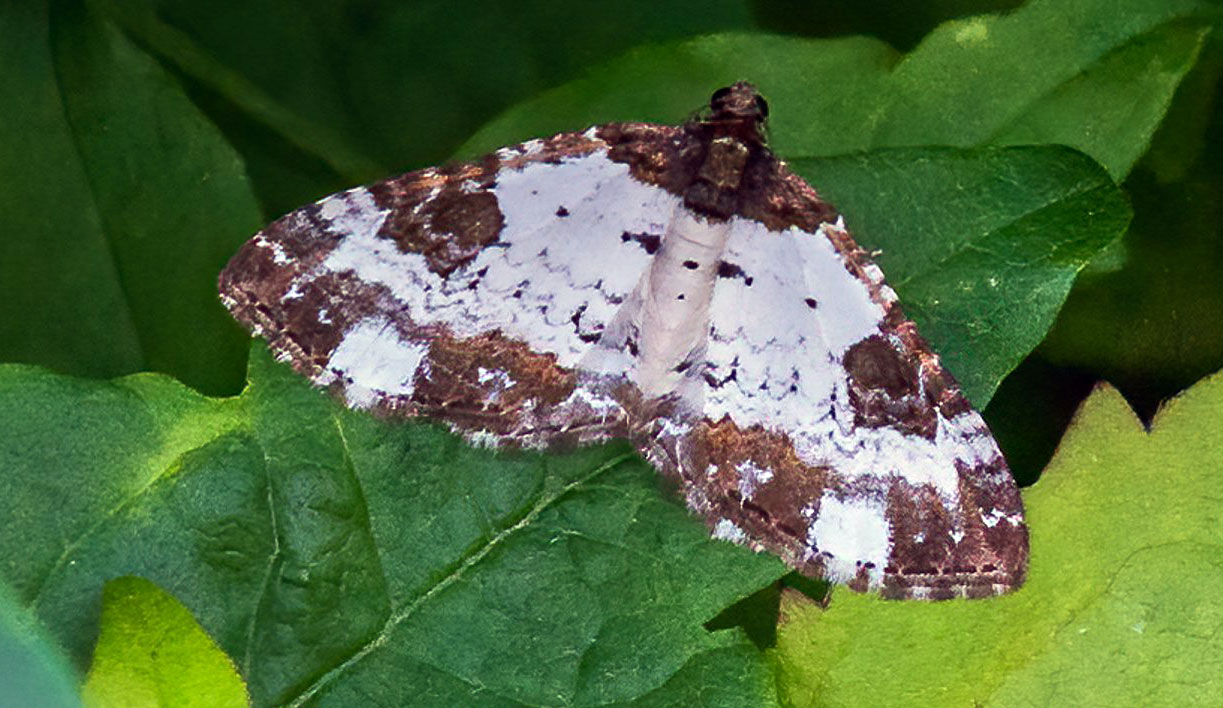
Pretty
Chalk Carpet Moth, Melanthia
procellata
Mill
Hill
Report
& Photograph by Keith
Wells
Adur
Valley & Downs facebook
22
July 2020

Elderberry Pearl Anania
coronata micro-moth, indoors
6 July
2020
Summer
had just about arrived on a cloudy
late afternoon on the lower slopes of Mill
Hill, with my first of the year
Small
Purple-barred Moth, Phytometra
viridaria, Shaded Broad-bar and
a Six-spotted Burnet Moth.
I also spotted my first of the year Cinnabar
Moth caterpillar
on
Common
Ragwort.
24
June 2020
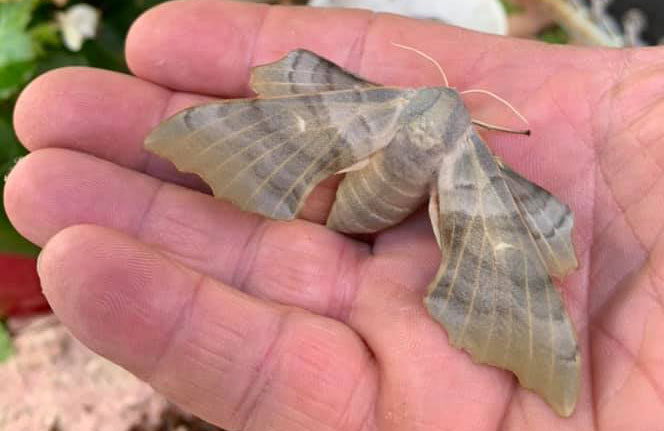
Poplar Hawk-moth at Old
Shoreham
Photograph
by Andy Berry
facebook
Adur
Hawk-moths

Vapourer Moth caterpillar,
Orgyia
antiqua, at north Shoreham
Photograph
by Helen
Swyer facebook
17
June 2020
Two
Cinnabar
Moths were seen over the crumbling southern
bank of Mill Hill Cutting.
1 June
2020
A
first of the year Cinnabar Moth
made a fleeting appearance on the lower slopes of Mill
Hill in the middle of the day.
28
May 2020
.jpg)
Burnet
Companion Moth
Mill
Hill
20
May 2020
A
sunny afternoon prompted a visit to the top part of Mill
Hill where occasional
butterflies
fluttered around and my first of the year Mother
Shipton Moth.
27
April 2020
.jpg)
Treble-bar
Moth
There
are two very similar species
Mill
Hill
Adur
Pyralids 2020
2019
 |
31
August 2019
This
moth was seen
in my kitchen and another one inside by my lounge.
Square-spot
Rustic Xestia
xanthographa confirmed |
9 August
2019
A
large 10 cm long yellow caterpillar of the Death's
Head Hawk-moth, Acherontia
atropos, was discovered in a north
Lancing garden. The moth is the largest moth
to appear in Britain, sporting a wingspan of up to 12 or 13 cm, a striking
species, though it is not native. Immigrants arrive from southern Europe,
usually several in each year, during the late summer and autumn.
Adur
Hawk-moths
8 August
2019
In
the sun the only observation remotely newsworthy was a Hummingbird
Hawk-Moth flying along the south-facing
carnot
wall of Shoreham
Fort. Even this had been seen more than
once in previous years.
.jpg) |
5
August 2019
A
Plumed
Fanfoot Moth, Pechipogo
plumigeralis, was seen in my kitchen and another one inside by
my front door. |
4 August
2019
A
Brimstone
Moth flew around indoors after midnight.
13
May 2019
A
flash of grey was a disturbed
Treble-bar
Moth, and a pretty Mother
Shipton Moth was recognised when it visited
Horseshoe
Vetch, Hippocrepis comosa
on the lower slopes of Mill Hill.
2 May
2019
A
Cinnabar
Moth was seen clearly on the lower slopes
of Mill Hill but it quickly disappeared
into shelter.
22
April 2019
A
colourful moth
amongst the Red Deadnettle
and other dense vegetation on the Widewater
flood plain was identified as my first ever Ruby
Tiger Moth, Phragmatobia
fuliginosa. It was strongly inclined
to hide and I could not get a photograph.

Brown-tailed
Moths nests with Caterpillars
I underestimated
the Brown-tailed Moth nests before
and I counted at least twenty on the Blackthorn.
About a third were full of caterpillars.
18
April 2019
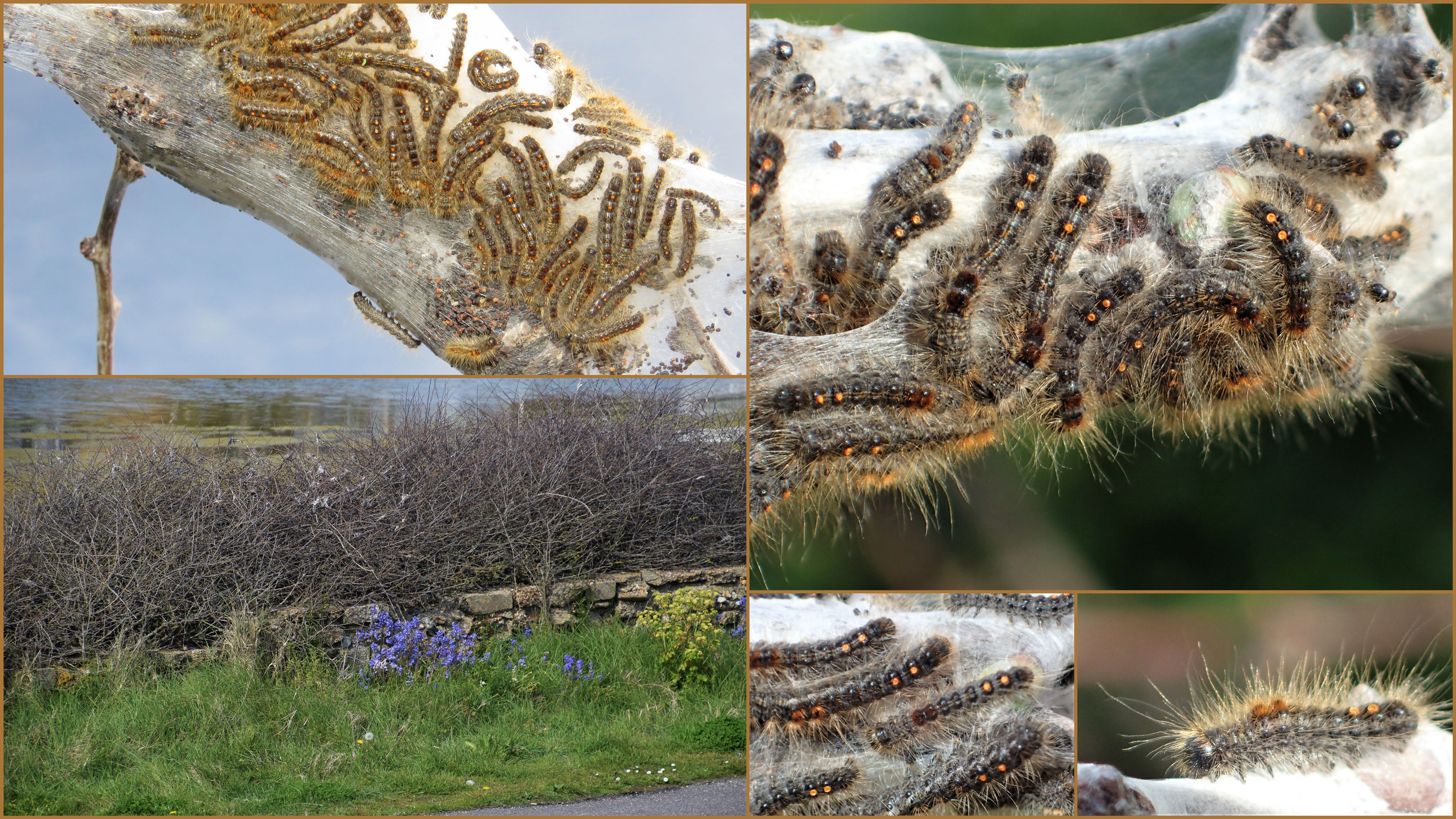
Brown-tailed
Moths nests with Caterpillars
By
the Widewater
car park, the Blackthorn
showed no trace of flowers or leaves
and the adjacent Hawthorn was in leaf and budding. It was on the
Blackthorn
mostly that the Brown-tailed Moths
had built about a dozen nests
housing scores of caterpillars
which will feed on the interlocking Hawthorn. Half the nests had the caterpillars
inside.
2018
5 November
2018
An
immigrant Hummingbird Hawk-moth,
Macroglossum
stellatarum, visited
a purple Salvia flower in
a Shoreham town back yard.
Adur
Hawk-moths
18
September 2018
Another
medium-sized moth was discovered in my kitchen and released. It was another
Lesser
Yellow Underwing Noctua
comes.
 |
9
September 2018
Another
medium-sized moth was discovered in my kitchen and released. It was another
Lesser
Yellow Underwing Noctua
comes.
There
was a smaller fawn moth L-album Wainscot,
Mythimna
l-album, as well, but I could not
capture it.
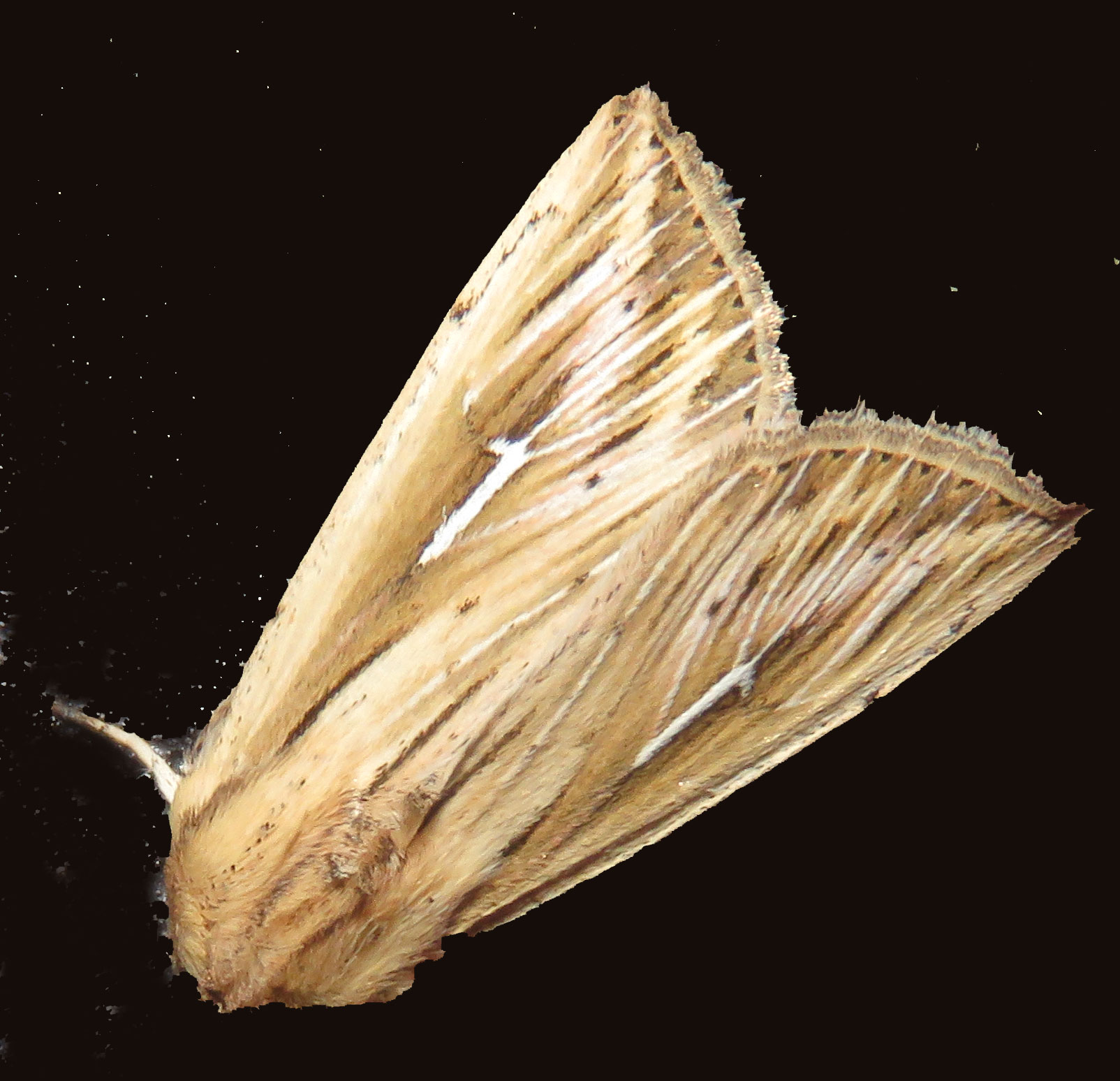
|
8 September
2018
A
partially colourful Red Underwing Moth,
Catocala
nupta,
found its way into my upstairs
bathroom in Shoreham. It was trapped and released but flew away rapidly
before I could get a photograph.
5 September
2018
A
Lesser
Yellow Underwing Moth Noctua
comes, found its way into my upstairs
kitchen in Shoreham. It escaped through a partially open window.
12
August 2018

Larva
of the Privet Hawk-moth, Sphinx
ligustri
Connaught
Avenue, Shoreham
Photograph
by Mikey Unsted
Adur
Hawk-moths
29
July 2018
Another
Plumed
Fanfoot, Pechipogo
plumigeralis, was seen indoors.
27
July 2018

Micro-moth
on
Greater Knapweed
Crambus
moth
?
Disturbed
on Mill Hill
21 July
2018
A
Plumed
Fanfoot, Pechipogo
plumigeralis, was seen indoors in my flat in Shoreham.
5 June
2018

Cinnabar
Moth
at
Erringham Gap
Nettle-tap
Moth, Anthophila fabriciana on
Ox-eye
Daisy
Verge
of the cyclepath, Old Shoreham
2017
 |
14
August 2017
Micro-moth
in my front garden with a small pond.
Celypha
lacunana |
30
June 2017
A
handful of Silver Y Moths
fluttered around the Sea Kale
and the other shingle plants on Southwick
Beach above the high tide
mark east of Carat's Cafe. A grasshopper
nymph was noted again despite there being
no grass.
15
June 2017
On
another breezy afternoon, there was a Meadow
Brown
on
the southern bank of Slonk Hill Cutting
and a Burnet Companion Moth
on Buckingham Cutting and that was all of interest. |
 |
10
June 2017
There
was a Snout Hypena
proboscidalis moth
disturbed on an overgrown impassable path FP 3138
from Old Shoreham to Mill Hill.
| 1
May 2017
Lackey
Moth
Caterpillars
in
their silken tent on
Blackthorn
on
the upper part of Mill Hill, south of the
Reservoir. |
|
2016
3
October 2016
A
common
moth settled against my garden shed in
my front garden. Its one of the "Plume"
Moths but I cannot recall which one
at the moment.
Common
Plume Moth, Emmelina
monodactyla ?
Unlike
other moths their wings are reduced to just a few feathery plumes - hence
the name. When resting, most species roll their plumes around each other
and hold them at right angles to the body, forming a T-shape. They have
slender bodies, and their legs are usually long and spiky. They are all
nocturnal and readily attracted to light.
|
|
30
August 2016
A
Bright-line Brown-eye Moth,
Lacanobia
oleracea, was discovered in my kitchen.
9 August
2016

Plumed
Fanfoot
 |
8
August 2016
Yellow-spot
Twist, Pseudargyrotoza
conwagana
About
twenty of this tiny moth were flitting around the southern steps of Mill
Hill
Their
larvae feed on the berries of Privet
and seeds of Ash. (Pratt, 2011).
|
24
June 2016
Unidentified
small moth from the lower slopes of Mill Hill.
I think this was Pyrausta despicata.
Silver
Y Moths and at least three Cinnabar
Moths were also present. |
|
23
June 2016
Between
the thunderstorms, an immigrant Silver
Y Moth, Autographa
gamma, landed in front of me in my
garden amongst the Buttercup leaves. |
 |
9
May 2016
Mill
Hill
28
October 2015
A medium-sized
moth
came in through the small window at night. It was not a Dusky
Thorn Ennomos
fuscantaria
25
September 2015
Cats
brought in two large caterpillars, one reported by Lorraine
Courant as green with white dots was most
likely the larva of a Lime Hawk-moth, Mimas
tiliae, and the other one reported by Trev
Smith was recognisable as the larva of
the Elephant Hawk-moth, Deilephila
elpenor.
Adur
Hawk-moths
 |
19
July 2015
A
pleasant sunny day prompted a visit to Mill
Hill just after midday. Large moths
noted were a Silver Y Moth,
frequent
Six-spotted Burnet Moths for the first
time this year, mostly over the lower slopes, Yellow
Shell (in the scrub), and the micro-moth
pyralid
Pyrausta nigrata.
Adur
Burnet Moths |
14
July 2015
The
stripy
caterpillars of the Cinnabar Moth were
common (100+) on Ragwort
on the upper part of Mill Hill, mostly
near the Reservoir. |
|
9
July 2015
Dark
Arches,
Apamea
monoglypha
This
medium-sized moth flew in through the window during the night and was discovered
flying around the electric light. |
 |
28
June 2015

15
June 2015
Nettle-tap
Moth, Anthophila fabriciana on
Ox-eye
Daisy
Verge
of the cyclepath, Old Shoreham |
|
7
June 2015
On
the southern steps leading to the lower slopes of Mill
Hill, I spotted a distinctive caterpillar on Great
Mullein leaves. Predictably, I identified
it as the unmistakable larvae of the Mullein
Moth. |
|

|
| |
|
Larvae
of the Mullein Moth
|
6 June
2015
My
first Hummingbird Hawk-moth, Macroglossum
stellatarum, of the year flew
straight into the carnot
wall on the south side of Shoreham
Fort. This was the same location that
this
moth was
seen last year and the moth flew rapidly along the high flint wall, not
seeming to be able to get past it. It was a sunny day with a Strong Breeze
(Force 6)
gusting to Gale Force 7. I
caught a glimpse of my first definite
Burnet
Companion Moth of the year on the southern
bank of Buckingham Cutting.
24
May 2015

|

|
|
Mother
Shipton Moth
|
Lower
slopes of Mill Hill
|
A Buzzard
descended from the low flying clouds and a Kestrel
hovered over the lower slopes of Mill Hill.
There were more butterfly watchers than actual butterflies,
but I did manage a glimpse of my first Small
Heath Butterfly of the year as well as my
first Mother Shipton Moth.
10
May 2015
It
was overcast around midday when I cycled up to the lower slopes of Mill
Hill, to try out my newish camera on any butterflies
that might be around. Alas as expected the dull conditions did not encourage
any butterflies. Two moths
were disturbed: a Treble Bar
and colourful Cinnabar Moth.
| 27
August 2014
Marbled
Beauty, Bryophila
domestica (=Cryphia domestica) in my front room, small |
|
27
August 2014
Setaceous
Hebrew Character
Xestia
c-nigrum
in
my front garden |
|
30
July 2014
A
damaged Tiger Moth
was discovered on my front path in my garden. It was in a poor condition
and may have been attacked by a Cat.
Tiger
Moths Information |
 |
8
July 2014
This
medium-sized moth flew in through the window during the night and was discovered
in the morning. It was identified as the Bright-line Brown-eye Moth,
Lacanobia
oleracea.
|
 |
2 July
2014
A
Hummingbird
Hawk-moth, Macroglossum
stellatarum, flew
straight into the carnot
wall on the south side of Shoreham
Fort. It flew off before my camera could
find it.
 9
June 2014
9
June 2014
On
Mill
Hill, south of the Reservoir I spotted my first two Cinnabar
Moths of the year. They were easily disturbed
and flew through the long grasses and stems of Greater
Knapweed quite quickly, and too elusive for
a tired photographer as I was about to leave Mill Hill.
7 June
2014
A
male Common Blue Butterflywas
spotted south of the carnot
wall of Shoreham
Fort, but
it was the unexpected appearance of an early immigrant Hummingbird
Hawk-moth, Macroglossum
stellatarum, flying just in front
of my feet that was most unexpected. I don't
think I have seen one so early in the year before.
15
May 2014
The
micro-moth Vine Moth,
Eupoecilia
ambiguella,
was spotted on the lower slopes of Mill Hill.
9
September 2013
Day
flying moths
were more than expected with a few Shaded
Broad-bar (4), about eight Treble-bars,
at least one pyralid
moth Pyrausta purpuralis,
and a Silver Y Moth on
the lower slopes of Mill Hill. |
 |
 |
|
Pyrausta
purpuralis
|
Shaded
Broad-bar,
Scotopteryx
chenopodiata
|
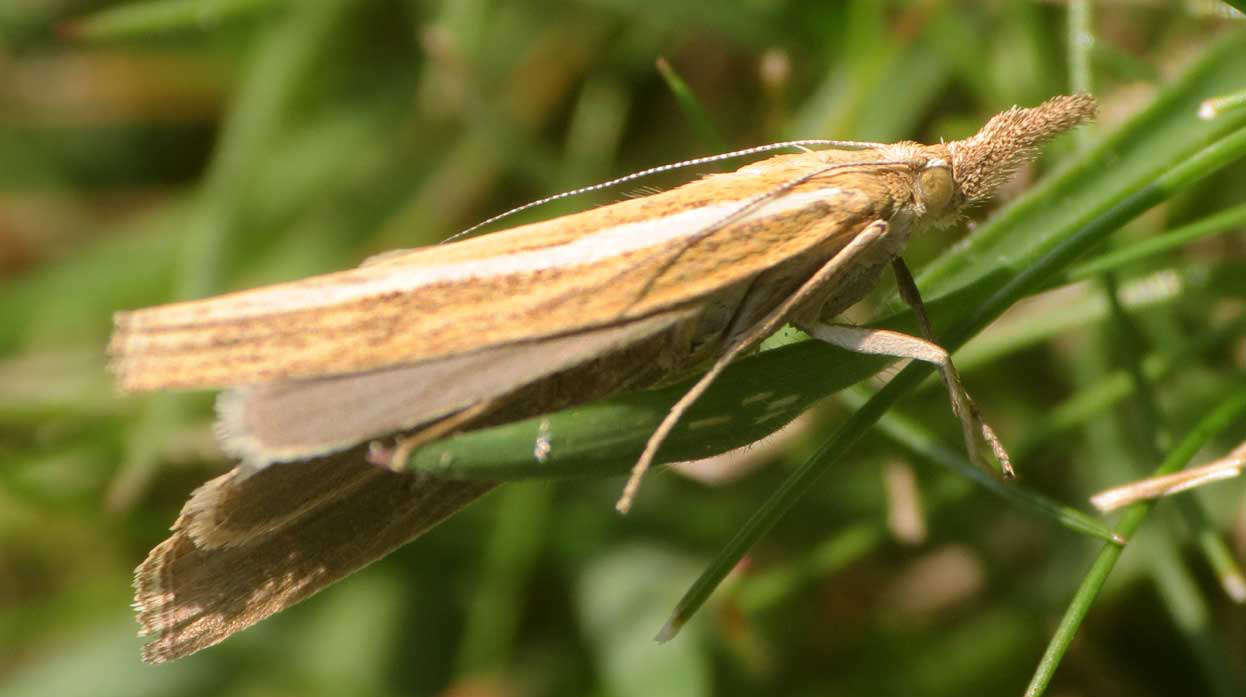 |
26
August 2013
This
micro-moth
was spotted on the lower slopes of Mill Hill.
Common
Grass-veneer
This
is Agriphila
tristella (probably) or Agriphila
selasella by the looks: it depends
upon whether that stripe has long or short fingers at the terminus.
|
26
August 2013
A
Shaded
Broad-bar,
Scotopteryx
chenopodiata, and a Treble-bar
Moth were spotted on the lower slopes
of Mill Hill.
14
July 2013
The
Burnet
Companion Moth (badly faded)
was attracted
to Marjoram on
the Downs Link Cyclepath south of the
Cement Works.
The
bright red was a Cinnabar Moth
and its caterpillars
were seen on the Ragwort on
Anchor
Bottom. |

|

|
|
|
Burnet
Companion Moth (badly faded)
|
Cinnabar
Moth
caterpillars
|
|
|
12
July 2013
Amongst
the longer grass at the top of Mill Hill,
I noted my first two Six-spotted Burnet
Moths of the year visiting tall flowers
amongst the grasses.
7
July 2013
In
the warmth (25.9 °C)
of the midday
sun, my first Meadow
Brown
Butterflies of the year, with the first day-flying
Narrow-bordered
Five-spot Burnet Moth and probably the
first Ringlet Butterfly
were seen over the verges of the Downs Link
Cyclepath 100 metres south of the Cement Works.
| 1
July 2013
Blackneck
Moth, Lygephila
pastinum, on
Buckingham
Cutting (south). When searching for Small
Blue Butterflies this moth seemed huge in
comparison. The caterpillar food plant of
this moth is Tufted Vetch which
is known to be present nearby. |
|
30
June 2013
The
first Hummingbird Hawkmoth
of the year visited my greenhouse in Shoreham.
17
May 2013
On
an overcast afternoon I visited Mill Hill
but virtually all the butterflies on the
lower slopes were hiding. I did manage to see my first Cinnabar
Moth of the year.
The
pyralid
moths
were frequently seen especially Pyrausta
nigrata but only one definite of the
colourful Pyrausta purpuralis.
I also spotted an occasional even tinier Violet
Cosmet Moth, Pancalia
leuwenhoekella. The
Pancalia
on the Horseshoe Vetch, Hippocrepis
comosa, was
waving its tentacles about energetically, with the distinct white bands
seen clearly.
15
September 2012
A
large green caterpillar of the species Eyed Hawk-moth, Smerinthus
ocellata, was brought in by a domestic
cat in Lancing. The warts or bumps on the
skin are important for identification from similar species like the Convolvulus
Hawk-moth, Agrius
convolvuli.
|
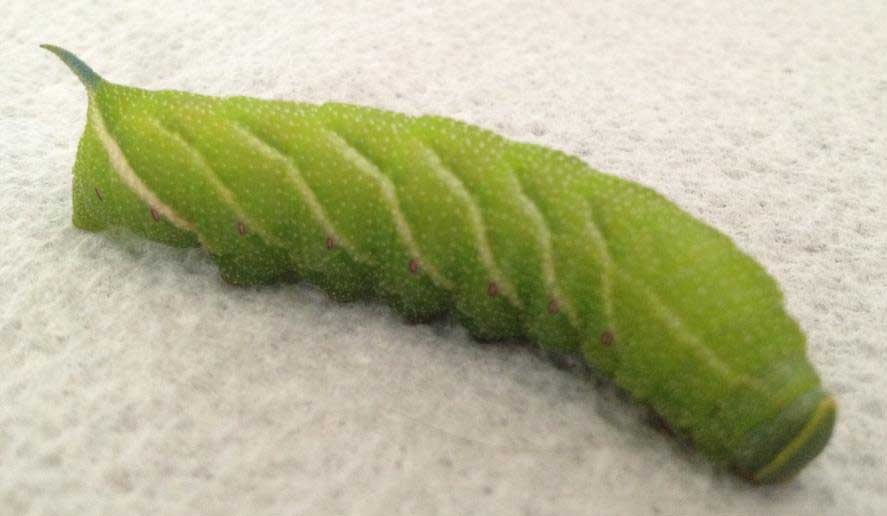 |
9
August 2012
Further
to east along the linear copse by the Slonk Hill
Cutting (south) I disturbed a Shaded
Broad-bar Moth,
Scotopteryx
chenopodiata.
6
August 2012
The
bright yellow fluttering in Southwick was a fresh Brimstone
Moth.
 31
July 2012
31
July 2012
In
contrast to the butterflies,
a few 6-spotted Burnet Moths
flew
with their wings whirring and would not keep still over the lower and middle
slopes of Mill Hill. Other moths
disturbed were two Common Carpet Moths,
a
Treble-bar
Moth
or two, and a Shaded
Broad-bar,
Scotopteryx
chenopodiata. Just one Pyrausta
nigrata pyralid
moth made an appearance, but these micro-moths
are easily overlooked.
Full
Butterfly Report
15
July 2012
A Swallow-tailed
Moth,
Ourapteryx
sambucaria, dropped out of the hedge
bordering a twitten connecting Corbyn
Crescent with Adelaide Square in residential
Shoreham. About twenty Cinnabar Moth
caterpillars
were
seen on just two budding
Ragworts
plants
near the top of the steps at the southern end of Mill
Hill.
Cinnabar
Moth Life Cycle
Corrupted file: records
lost for April to July. Restitution
started as far as possible. Some mentions of moths will be found on
Adur
Butterfly and Moth List 2012
1 July
2012
Exasperated
in the blustery condition (Force
6 gusting to Force 7) as I persisted in
attempting to photograph the flowers
blowing in the breeze, I would probably have missed my first Large
Skipper of the year on the verges of the
Downs-Coastal
Link Cyclepath near the Cement Works end.
At the same time there was a Small Heath
Moth spotted resting briefly on a grass.
 |
15
June 2012
A
"woolly bear"
caterpillar
of the Garden
Tiger Moth, Arctia
caja, crawled over the Marsh
Marigolds in my front garden. More
have been seen in Shoreham Beach gardens
and by the houseboats where they are known as Hairy
Marys. |
17
June 2012
I
did my weekly butterfly transect at Mill
Hill. It was good to see sizeable Mullein
Moth caterpillars in large numbers on
three
Great Mullein
plants.
20
May 2012
Again,
too cool (14.2
°C) for butterflies
and too breezy (Force
4 from the north) to photograph flowers
close-up, overcast without any sun, the rain of the past few days had nevertheless
stopped.
Nevertheless, I made an afternoon
trip to
Mill Hill to check out the extent
of the
Horseshoe Vetch,
Hippocrepis
comosa, which was not so extensive
in previous years and nearly at its peak. Despite the cool conditions a
Small
Purple-barred Moth, Phytometra
viridaria, made a fleeting appearance.
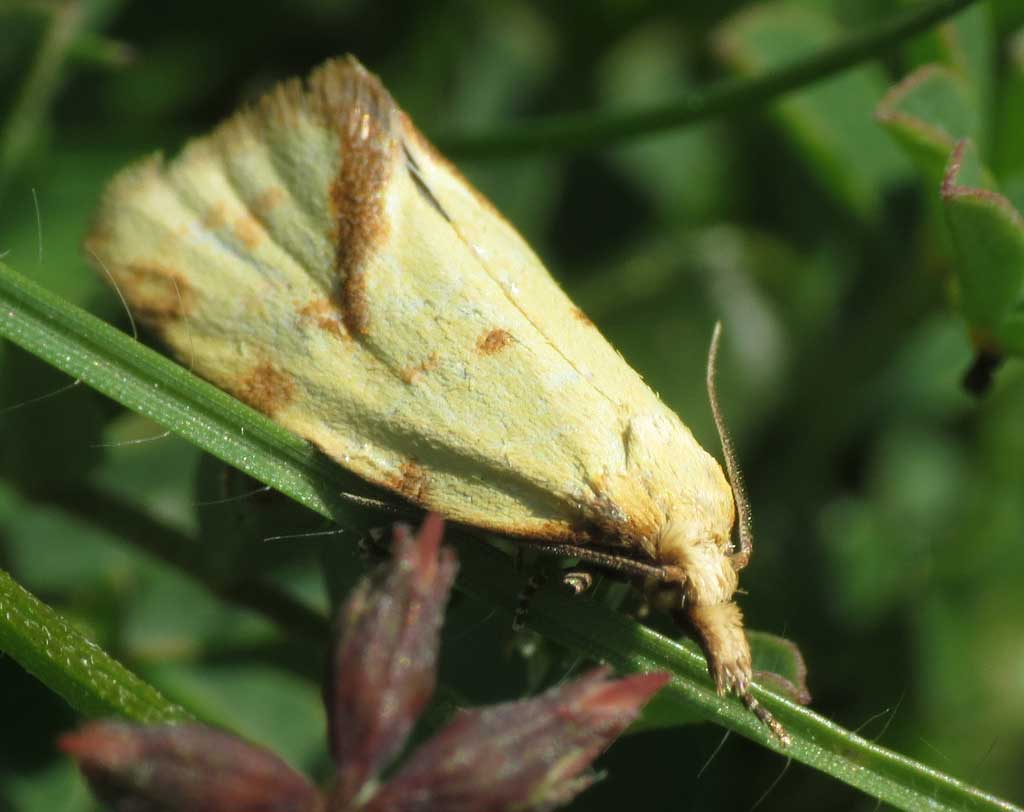 |
13
May 2012
The
micro-moth Agapeta
hamana from the lower slopes of
Mill
Hill.
The
common name is "Hook-marked Straw Moth"
but it's more correct to write the scientific name Agapeta
hamana belongs to family Tortricidae.
Several
identifications on flickr
This
yellowish species is fairly common throughout most of Britain. It occurs
on waste ground and other places where the food plant, Thistle
(Carduus), occurs. It flies from June
through August, mainly at dusk or at night,
but it can easily be disturbed during the day. |
26
March 2012
Small
pyralid
moths
were frequently seen flitting amongst
the
violets on
the lower slopes of Mill Hill, with Pyrausta
nigrata, Pyrausta purpuralis and
Pyrausta
despicata seen very clearly and all
three species definitely identified. This was the earliest and the first
time in March
I seen any of these three species. The micro-moth Violet
Cosmet, Pancalia
leuwenhoekella, was spotted on a Sweet
Violet flower.
Adur
Butterfly List 2012
3 October
2011
A
Silver
Y Moth fluttered amongst the remains of
the meadow flowers south of the Reservoir
on Mill Hill.
2
October 2011
Three
crimson brown medium-large moths
flew distinctly in three different locations, the first by the hedgerow
bordering the railway line in Dolphin Road, Shoreham,
the second on the cyclepath south of the Toll
Bridge, Old Shoreham. and the the third on on the Adur
Levels beneath Mill
Hill, in the pasture used as a car book sale location on summer Sundays.
I have identified these moths
as most probably the day-flying male Vapourer
Moth, Orgyia
antiqua, based on past experience,
but I have never been able to look at one of these moths
settled.
17
August 2011
We
saw a scary caterpillar (Val
spotted it first): it puffed itself up and
showed us a couple of threatening "eyes". We think it was a Small
Elephant Hawk-moth,
Deilephila
porcellus, caterpillar
putting its life at risk by crossing the Downslink
Cyclepath, just north of the A27
Flyover. In the overcast conditions, there
were few butterflies
out.
30
June 2011
My
first of the year Cinnabar Moth
caterpillar was seen on a budding Ragwort
plant on the lower slopes of Mill Hill.
27
June 2011
On
a hot and humid morning, I noticed the first
Humming-bird
Hawkmoth of the year flying energetically
around the vegetation at the top of Chanctonbury Drive, north Shoreham.
23
May 2011
My
first Brimstone Moth, Opisthograptis
luteolata, of the year flew
in through a small open window, attracted to the light at 1:30
am.
8 May
2011
On
a cool (13.6 °C)
and cloudy day, there was a Gentle Breeze (Force
3) but no gaps in the clouds for the sun
to shine. The first glimpse of fluttering
on the lower slopes of Mill Hill was my
first of the year Yellow Shell Moth,
and first of two seen, and also one of the Treble-bar
Moths. After it began to spit with rain,
I avoided the scrub and wandered over the middle slopes where I notes my
first two Silver Y Moths
of the year.
Full
Butterfly Report
24
April 2011
The
rarely recorded day-flying micro-moth Elachista
biatomella was caught and identified
by Tony Davis
on Mill Hill and an evening moth trap caught 37 other species of moths
including
four Barred Tooth-striped Moths.
 |
12
April 2011
The
tiny Violet Cosmet Moths,
Pancalia
leuwenhoekella,
were frequently seen
on Daisies on
the lower slopes of Mill Hill. |
11
April 2011
A
few of us had an impromptu gathering at Mill
Hill Nature Reserve
on Monday evening, unfortunately it was quite windy and clear which isn't
very conducive to mothing, but we did it anyway. As part of an ongoing
Barred Tooth-striped survey, we had one 125W MV trap and one 60W actinic
running in different areas. We placed the actinic near to some mature Privet
where we had counted the most Barred Tooth-striped (BTS) moths a couple
of weeks ago.
Whilst
we were waiting for the moth traps to warm up and the moths to come in,
we did a bit of dusking and found some moths on the wing and we all learnt
some new things about beetles
from Graeme
Lyons; thanks Graeme! The first Barred
Tooth-striped was netted at 8.30 pm,
albeit a worn one. Several other species were netted including Brimstone
Moth, Streamer, Early Grey, Double-striped Pug, Powdered Quaker, Waved
Umber, Early Thorn and Shoulder-stripe to name but a few. We
found two Barred Tooth-striped on the Privet, unusually low down as usually
they perch quite high up, we think that the wind hadn't helped our survey!
When
checking the MV trap later on we found three Barred Tooth-striped attracted
to it, but not into it. Seven Barred Tooth-striped were attracted to the
actinic, but again not all of them were in the trap. So, we had 12 Barred
Tooth-striped altogether which wasn't bad going considering the weather!
Other species caught in the traps included Green Carpet, Red Twin-spot
Carpet, Red Chestnut, Least Black Arches, Small Waved Umber, Flame Shoulder,
V-Pug and Hebrew Character. Twenty macro species in total, plus
a couple of micros - Pyrausta despicata and Semioscopis
steinkellneriana.
There
appeared to be a good number of species, a few of which are listed as flying
in May onwards. We also found one roosting Grizzled
Skipper.
Adur
Skippers
-
29 March
2011
-
The first
appearance of the tiny pyralid
micro-moth Pyrausta
despicata at Mill Hill (Shoreham)
has always provided a good guide to the timing of subsequent springtime
emergences. I saw a couple of these together with a very early Small
Purple-barred Moth, Phytometra viridaria.
A
careful examination of the Pancalia micro-moths on the lower
slopes of Mill
Hill revealed some (17) to be the Scarce
Violet Cosmet, Pancalia
schwarzella, (ID confirmed by Tony
Davis, and the first Sussex records since
1931) rather than the common species Violet
Cosmet, Pancalia
leuwenhoekella. The latter species
has a white band on its antennae.
25
March 2011
In
the evening we lugged a generator and MV trap down to the bottom of Mill
Hill to survey for Barred Tooth-striped
Moth (BTS), Trichopteryx
polycommata, and see what else was
around. Although one Barred Tooth-striped flew to the light at 7:30
pm, this was the only one that the MV attracted
this time, whereas on previous visits good number have come to the trap.
Between the trap and wandering around with nets we managed to record 14
moth
species including 1 Oak Beauty, 8
Clouded Drab, 1 Red
Chestnut and a few micros including a very pretty one with raised scales
on its wings that we have tentatively identified as Acleris
cristana. In addition to the BTS that visited our trap we found
21 resting on privet, 1 resting on a grass stem and a final moth that landed
on Penny as we were walking back up to the car with the trap. If anyone
else goes to hunt for them, they were very obvious on the Privet
about
20 meters above the northern end of the lower path, a couple of hours after
sunset.
-
 |
1
August 2010
A
small
brown moth settled near the Privet on the
lower slopes of Mill Hill. I have identified
this as the Bordered Straw,
Heliothis
peltigera, a long distance immigrant. |
30
July 2010
Behind
the small garden sized meadow that is the southern bank of the Buckingham
Cutting where
the path goes through a hedgerow with lots of Brambles,
I noted a Yellow Shell Moth
and two Shaded Broad-bar Moths.
On the south-eastern bank of the Mill Hill Cutting there was a Small
Purple-barred Moth.
28
July 2010
A
Carpet
Moth (probably the Silver-ground
Carpet, Xanthorhoe
montanata) was seen on the hedgerow
part of Mill Hill Cutting, south side, a Yellow
Shell Moth was around the garden hedge
at the top of the Pixie Path, Three Six-spotted
Burnet Moths were all attracted to one
Greater
Knapweed flower,
and Silver Y Moths
were noted on Buckingham Cutting, south side, and the latter in the Mill
Hill meadows.
20 July
2010
My
first
Hummingbird Hawk-moth,
Macroglossum
stellatarum, of the year hovered/flitted
around a clump of Greater Knapweed
in the north-west corner of Frampton's Field, Old Shoreham, as seen from
the Pixie Path. The moth stayed around for
a few minutes and it never seemed to keep in one place long enough for
a photograph, although my observation was disturbed by a passing couple
and their dog at an inopportune moment.
Butterfly
& Moth Report
4
July 2010
Like
a falling leaf a Swallow-tailed Moth,
Ourapteryx
sambucaria, dropped out of the tree
canopy on to the meadow on the verges of the Coastal-Downs
Link Cyclepath midway between Old Shoreham and the Cement Works at Upper
Beeding.
Butterfly
& Moth Report |
 |
27
June 2010
Occasional
Silver Y Moths, a few Burnet
Companion Moths, at least five unidentified
Burnet
Moths and one Cinnabar
Moth were all seen on Mill
Hill.
Butterfly
& Moth Report
 21
June 2010
21
June 2010
From
a distance McIntyre's Field (north of Lancing Manor and the eastern part
of Lancing Ring Nature Reserve) was covered
in the yellow of Bird's Foot Trefoil,
and close-up hundreds of of small moths
and butterflies could be disturbed in the
long grass meadow. The numbers were exceptional and included frequent
Common
Blue Butterflies
of
both genders, frequent Burnet Companion
Moths, numerous Common
Carpet Moths, and at least a dozen moth
species that had to remain unidentified because of lack of time and knowledge.
The
picture on the right is probably the Grass
Rivulet Perizoma
albulata
Full
Butterfly Report
At
dusk a large moth was silhouetted against the sky amongst the rooftops
in The Twitten in Southwick and this was thought to be one of the immigrant
Hawkmoths.
9 June
2010
Small
moths
(but not the usual pyralids)*
were frequently seen in the amongst the herbs on the lower slopes of Mill
Hill, and there were at least three Burnet
Companions Moths and more than one Treble-bar
Moth. The Hawthorn scrub added a Common
Carpet Moth. (*possibly the Light
Brown Apple Moth)

In the
meadow to the north of the upper car park on Mill Hill, I disturbed a handful
of Silver Y Moths.
8 June
2010
My first
Cinnabar
Moth of the year flitted amongst the grasses
and herbs on the southern bank of Buckingham Cutting,
north Shoreham.
30
May 2010
 My
first Silver Y Moth
of the year was seen by the Reservoir
on Mill Hill and another one the lower
slopes where I saw at least one Burnet
Companion Moth for the first time this
year. The small pyralid
moth
Pyrausta nigrata was seen, but I did
not spot any of the other pyralids. In the scrub there was my first Carpet
Moth of the year. I have identified this carpet
moth as the Purple Bar,
Cosmorhoe
ocellata. This is my first record
of this common species.
My
first Silver Y Moth
of the year was seen by the Reservoir
on Mill Hill and another one the lower
slopes where I saw at least one Burnet
Companion Moth for the first time this
year. The small pyralid
moth
Pyrausta nigrata was seen, but I did
not spot any of the other pyralids. In the scrub there was my first Carpet
Moth of the year. I have identified this carpet
moth as the Purple Bar,
Cosmorhoe
ocellata. This is my first record
of this common species.
Full
Butterfly & Moth Report
27
April 2010
About
eight Burnet Companion Moths
were seen on my Anchor Bottom transect
21
October 2009
No butterflies
were seen in Old Shoreham on a cloudy day, but there was a Vapourer
Moth, Orgyia
antiqua, fluttering
at low level over the towpath just north of the Toll
Bridge.
4 October
2009
Puddles
indicated it had rained over night on an overcast day,
but I had the opportunity to note a low level Vapourer
Moth, Orgyia
antiqua over the slope at the entrance
to Shoreham Library from St. Mary's Road. Usually, these small day-flying
moths are seen flying over the top of hedgerows and too far away to be
sure of their identity.
2 October
2009
The small
brown moths seen over the hedgerows and for the last few days were thought
to be Vapourer Moths,
Orgyia
antiqua.
10
September 2009
This
brightly coloured caterpillar was spotted crawling across the tarmac approach
to
Tarmount Public Hard
in Shoreham. It is the larva
of the Sycamore Moth Acronicta
aceris. The moth varies in colour
from pale grey to dark sooty-grey. The caterpillar
feeds
on the leaves of Sycamore or Horse Chestnut.
What's
this Caterpillar? |
 |
 |
6
September 2009
This
small
moth was seen fluttering around in some very
short turf north of the Reservoir on
Mill Hill.
This
looks like a Rush Veneer, Nomophila
noctuella, |
19
August 2009
Unidentified
small moth amongst the long grass on the
Pixie
Path. This looks like this could be a
pyralid. |
|
17
August 2009
A
probable Shaded Broad-bar,
Scotopteryx
chenopodiata, was spotted on the lower slopes of Mill
Hill. Other larger moths noted included occasional Silver
Y Moths, at least one
Carpet Moth, one Brimstone
Moth and occasional Treble-bar
Moths. |
 |
4 August
2009
The
most notable observation of the day was a markedly patterned Magpie
Moth amongst
the Stinging Nettles on the Waterworks Road,
Old Shoreham.
3 August
2009
Four
species of the larger moths were seen in daylight on Mill
Hill and its approaches. These were occasional Silver
Y Moths and Six-spotted
Burnet Moths, a Yellow
Shell and a Treble-bar
Moth.
23
July 2009
The
highlight of the day, along the Coastal-Downs Link
Cyclepath south of Upper Beeding, was the first Hummingbird
Hawk-moth
since
2006
whirring away amongst the meadow herbs on the edge of the verges, its orange
rear and vibrating wings most distinctive.
9
July 2009
By
the Reservoir on Mill Hill the first Cinnabar
Moth
caterpillars of the year were seen on
a small clump of Ragwort. |
 |
30
June 2009
The
first Brimstone Moth
of the year was seen in Worthing Town Centre (Chatsworth Road).
29
June 2009
On
the Adur Levels, in a field north of Cuckoo's
Corner, a few Narrow-bordered Five-spot
Burnet Moths, Zygaena lonicerae, visited
Tufted
Vetch, for the first record in 2009.
Adur
Burnet Moths
26
June 2009
A
Privet
Hawkmoth was photographed on Shoreham
Beach.
22
June 2009
A cycle
ride from Old Shoreham to Annington Sewer
along the Coastal-Downs Link Cyclepath
I spotted one Cinnabar Moth,
and frequent 6-spot Burnet Moths,
as well as a few Burnet Companion Moths.
It was interesting to note the relatively languid flight of the Cinnabar
contrasted to the whirring of the 6-spot Burnet
Moths.
12
June 2009

|
 |
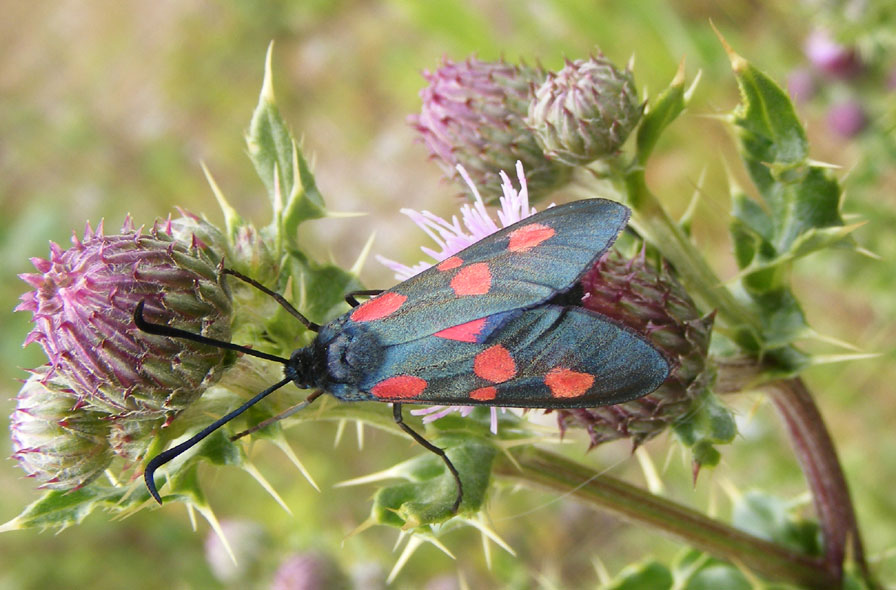 |
Straw
Dot Rivula sericealis
amongst the long grass on Anchor Bottom.
ID
by Su Reed
|
Tattered
Cinnabar
Moth
|
Six-spotted
Burnet Moth on Creeping
Thistle
|
My first
of the year Six-spotted Burnet Moth
was one of two on Creeping Thistle
at the back of Dacre Gardens next to Anchor
Bottom, Upper Beeding. One tattered Cinnabar
Moth was seen on Anchor Bottom very close
to the stile at the bottom western end near Dacre Gardens. There was also
a Yellow Shell Moth
and a Burnet Companion Moth.
Full
Butterfly & Moth Report
Adur
Burnet Moths
31
May 2009
One
each of the following five medium-sized moths were recorded flying in the
day on Mill Hill
and its approaches:
a
Silver
Y Moth and my first Burnet
Companion Moth of the year, Yellow
Shell,
Mother
Shipton and a Cinnabar
Moth.
I saw
a number of Six-spot Burnet Moths
flying at Beeding Hill.
24
May 2009
The
small verge area at Buckingham Cutting on
the southern side produced a few Treble-bar
Moths and a Silver
Y Moth.

|
|
|

|
|
Silver
Y Moth
|
|
|
Mother
Shipton Moth
|
The
lower slopes of Mill
Hill hosted what at first glance appeared
to be Grizzled Skippers,
but close inspection revealed these to be three of the attractive Mother
Shipton Moths. There was at least one
Silver
Y Moth over the fading Horseshoe
Vetch,
Hippocrepis comosa,
on the lower slopes.
20
May 2009
There
was a Treble Bar Moth
and my first Silver Y Moth
of the year, but the small pyralid moths were
not seen on the lower slopes of Mill Hill.
10
May 2009
My
first Cinnabar Moth
of the year took flight on the lower slopes of Mill
Hill showing its distinct red underwing. A Small
Purple-barred Moth, Phytometra
viridaria, landed on a Horseshoe Vetch,
Hippocrepis
comosa, flower.
The micro-moth Pyrausta nigrata
was now just frequently seen.
29
April 2009
Mike
Parsons and his two colleagues from Butterfly
Conservation in Dorset were bashing the
Privet
on the lower slopes of Mill Hill in an
unsuccessful attempt to find the caterpillars of the Barred
Tooth-striped Moth, Trichopteryx
polycommata.
Mike identified
for me a Green Carpet Moth,
Colostygia
pectinataria. It escaped the net before
I had a chance to look at it. I had always
realised that some of the Carpet Moths seen on Mill Hill were different
in colour from the ones seen in Shoreham town and I have probably misidentified
them before as the Common
Carpet Moth,
Epirrhoe
alternata. The micro-moth Pyrausta
nigrata was very common on the lower
slopes as in the previous week. A Treble-bar
Moth fluttered around some rabbit droppings.
My first Common Mint Moth,
Pyrausta
aurata, of the year was seen on an Alexanders
on the path that runs along the south of Frampton's Field, Old Shoreham.
This one was rather drab in colour.
Adur
Pyralids
23
April 2009
The
Pyrausta
moths were common on the lower
slopes of Mill Hill, including a few Pyrausta
purpuralis. I spotted my first Small
Purple-barred Moth, Phytometra
viridaria, of the year.
21
April 2009
A
colourful pyralid
micro-moth Pyrausta
purpuralis amongst the Horseshoe
Vetch,
Hippocrepis comosa,
leaves on the lower slopes of Mill Hill,
was a first of the year. There were far more than the counted 17 Pyrausta
nigrata and five Pyrausta
despicata. All the small moths flitted
about rapidly and were tricky to photograph.
Full
Butterfly & Moth Report
14
April 2009
Two
small day-flying in moths put in their first appearance of the year on
the lower slopes of Mill Hill (Old Shoreham):
these were the pyralids, three Pyrausta
despicata and two Pyrausta
nigrata. A
Treble-bar Moth landed on me over the
lower slopes of Mill Hill.
12
April 2009
We
photographed the following moths on Mill Hill:
Barred
Tooth-striped, Trichopteryx
polycommata, V-Pug and Shoulder
Stripe.
4 April
2009 Evening
A
search of the Privet
bushes on Mill Hill did not produce the desired Barred
Tooth-striped Moth, Trichopteryx
polycommata,
but
we did find three Pale
Flat-body, Agonopterix
pallorella, micro-moths on the lower
slopes.
3
January 2009
Our
first moth of 2009
was, unexpectedly, a Double-striped Pug,
Gymnoscelis
rufifasciata, that we found in our
kitchen (Mill Hill, Shoreham).

11
November 2008
This
caterpillar
was spotted crawling across the sea front pavement in east Worthing.
One
possible is the larva of the Muslin Moth,
Diaphora
mendica.
Another
possible is the larva of the colourful Ruby
Tiger Moth, Phragmatobia
fuliginosa. |
|
17
October 2008
A
few Vapourer Moths
took flight from the lower slopes of Mill
Hill.
16
August 2008
This
caterpillar
was seen by the railway level crossing gates in Eastern Avenue, Shoreham.
It was a larva of the Toadflax Brocade,
Calophasia
lunula.
|
 |
 |
6 &
10 August 2008
The
small pyralid
moth,
Pyrausta
purpuralis was spotted amongst the
undergrowth of herbs on the the
lower slopes
of Mill Hill. A Silver
Y Moth was noted in the dense meadows
north of the upper car park on Mill Hill, and one faded Six-Spot
Burnet Moth was noted on Greater
Knapweed, but there could have been more.
At least three Treble-bar Moths
were fluttering around on the lower slopes of Mill Hill.
30
July 2008
The
most interesting lepidopteran
observation were the frequent occurrence of a small brownish moth on the
lower
slopes of
Mill Hill. At least twenty
flitted about in a five metre square patch.
It is expected to be a common species. The
flash of grey was a Treble-bar Moth. |
This
is Synaphe punctalis,
a pyralid moth associated with shingle and sand
dunes as well as other dry habitats such as chalk downland. Not a common
species, but it seems to have spread its range in Sussex in recent years.
The larvae feed on mosses.
|
 |
28
July 2008
Just
the one Cinnabar Moth caterpillar
was seen on Ragwort
on the far north-west of the Mill Hill Nature
Reserve by the stile.
27
July 2008
A
Silver
Y Moth was recorded on the upper part
of
Mill Hill, with the small pyralid
moth,
Pyrausta
nigrata seen on the lower
slopes of Mill Hill, and Six-Spot Burnet
Moths frequently seen both on Mill Hill
and over the verges of the Coastal Link Cyclepath
to Upper Beeding.
15
July 2008
Six-spot
Burnet Moths were frequent on Mill
Hill, with most in the area to the west of the upper car park. A Silver
Y Moth was seen on the short grass open
plateau. The small pyralid
moth, Pyrausta
nigrata was occasionally seen on the
lower
slopes of Mill Hill, with some of them much more faded than others.
There were probably many more that went unnoticed.
14
July 2008
On
Greater
Knapweed, the first confirmed Six-spotted
Burnet Moths were spotted on the south-facing
Horseshoe
Vetch slope of Anchor
Bottom, Upper Beeding.
Adur
Burnet Moths
11
& 13 July 2008
The
small pyralid moth,
Pyrausta
nigrata was frequently seen on the
lower
slopes of
Mill Hill in the afternoon
and morning. Most of them were so faded that they were originally mistaken
for one of the other pyralids.
5 July
2008
The
first Small Purple-barred Moth, Phytometra
viridaria, of 2008
was seen on the lower slopes of
Mill
Hill, late in the afternoon.
3 July
2008
My
first Silver Y Moth of
2008
whirred
around the undergrowth on the
Buckingham Cutting.
Full
Butterfly Report
1 July
2008
A
Burnet
or
Cinnabar Moth fluttered rapidly over
the shingle and vegetation near the Old Fort on
Shoreham
Beach.
30
June 2008
In
the breezy sunshine, a Burnet or Cinnabar
Moth fluttered rapidly on the towpath
next to the River Adur
halfway between Cuckoo's Corner
and the Cement Works.
14
June 2008
Two
unusual bumblebee-sized insects flew over Coronation Green, Shoreham, in
the afternoon. I think these may have been Narrow-bordered
Bee Hawk-moths, Hemaris
tityus. The moths did not stay still
enough for a positive identification. They flew steadily in a south-north
direction and they appeared like immigrant insects.
9 June
2008
A
very rare Spurge Hawk-moth,
Hyles
euphorbiae, was caught at Shoreham.
It is
a sporadic migrant to southern England from south Europe, there are only
a handful of recent records.
8 June
2008
My
first Cinnabar Moth
of the year and a Burnet Companion Moth
were
seen on the Buckingham Cutting, southern
bank.
2 &
8 June 2008
My
first pyralid
moth
Pyrausta aurata
of the year is seen in my garden in Corbyn Crescent, Shoreham.
27
May 2008
On a day
too cool for butterflies to be flying in
any numbers, a Burnet Companion Moth
flew down on to the Buckingham Cutting
southern side and much to my surprise this restless day-flying moth then
flew rapidly across both lanes of the A27
dual carriageway and further north.
22 May
2008
My
first definite Burnet Companion Moth
of the year fluttered amongst the vegetation on the Lancing
Ring meadows.
Lancing
Ring Report
 21
May 2008
21
May 2008
My
first confirmed Mother Shipton Moth of
the
year was seen on a clearing on the southern side of the Slonk
Hill Cutting.
16
May 2008
On
a day too cool (12.3 °C)
for butterflies, a Common
Carpet Moth and a Yellow
Shell Moth were disturbed on the northern
bank of the Slonk Hill Cutting.
 |
15
May 2008
Large
Caterpillar on Yellow
Flag Iris on
Spring
Dyke, north
of Old Shoreham.
These
larvae are difficult to identify. It could be The
Drinker, Euthrix
potatoria. |
10
May 2008

This
small Carpet Moth,
(Common species is Epirrhoe
alternata), flew into the shade.
This may actually be the Dark-barred Twin-spot
Carpet Moth, Xanthorhoe
ferrugata.
8 May
2008
On
the grassy and herb verges of the Coastal
Link Cyclepath south of the Cement Works, I saw my first Burnet
Companion Moth of
the year in late afternoon. This pretty moth fluttered amongst the herbs
and long grasses.
 2
May 2008
2
May 2008
On
a mild sunny day, 13.2 °C, at
least two Pyrausta nigrata pyralid
moths, the first small Pyrausta
purpuralis pyralid moth
of
2008,
and
a fluttering
Treble Bar Moth were
noted on the lower slopes of Mill
Hill.
27
April 2008
On
a cool day, just one Pyrausta nigrata
pyralid
moth was spotted on the lower slopes of
Mill
Hill. A Treble-bar Moth,
Aplocera
sp. was spotted resting.
20
April 2008
A
passage journey over the lower slopes
of Mill Hill revealed four Grizzled
Skippers visiting Dog
Violets and at least one of the first Pyrausta
nigrata pyralid
moths of 2008.
5 April
2008
Mill
Hill SMG Meeting
Despite
the awful forecast and plummeting temperature the first SMG evening field
meeting of the year at Mill Hill near Shoreham
was well attended. However, we only saw three moths - but nobody was complaining;
two were of our target species Barred Tooth-striped,
Trichopteryx
polycommata, and the other was the
micro Pale Flat-body, Agonopterix
pallorella.
6 November
2007
A
Silver
Y Moth was spotted over the northern part
of the lower slopes of
Mill
Hill.
19
October 2007
The
caterpillar of the Pale Tussock Moth, Calliteara
pudibunda, crawled across the pavement on the approaches to Lancing
Clump (eastern car park). I put it on the grass verge for the photograph. |
 |
 |
27
August 2007
The
Carpet
Moth was seen on the lower
slopes of Mill Hill. I disturbed this
night-flying moth. |
August
2007
This
rare immigrant Death's Head Hawk-moth,
Acherontia
atropos,
was
discovered in my back garden which is adjacent to Shoreham Beach between
the harbour arm and The Burrells.
.
This
the largest moth to appear in Britain, sporting a wingspan of up to 12
or 13 cm, this is a striking species, though it is not native. Immigrants
arrive from southern Europe, usually several in each year, during late
summer and autumn.
It
has the unusual habit of entering beehives in search of honey, and if handled,
emits a loud squeak. The large caterpillar feeds on most Solanaceae, especially
Solanum
tuberosum (Potato), Solanum dulcamara, Lycium europaeum, Lycium
barbarum, Atropa belladonna (Deadly Nightshade), Nicotiana tabacum
(Tobacco)
and Datura stramonium (Thorn-apple/Jimson weed).
|
 |
9 &
12 August 2007
An
attractive small Pyrausta
purpuralis moth was
again seen on both days in the main Tor Grass area on the lower
slopes of Mill Hill. The wavy line
pattern was most distinctive with this colourful moth that did not settle
long enough for a photograph.
Adur
Pyralids
12
August 2007
The
Light
Brown Apple Moth Epiphyas
postvittana settled in my Garden Privet
hedge in my front garden in Corbyn Crescent,
Shoreham.
29
July 2007
A
Silver
Y Moth flitted through the vegetation
on the wildlife meadow north of the car park on
Mill
Hill. Frequent 6-spot Burnet Moths
were
seen on the breeze-swept plateau most often visiting Greater
Knapweed. A few Yellow
Shell Moths and at least one Treble-bar
Moth was recorded over the lower
slopes of Mill Hill.
3 July
2007
The
southern bank of the Slonk Hill Cutting a Cinnabar
Moth fluttered over the vegetation.
1 July
2007
My first
6-spot
Burnet Moth of the year visited a flowering
Buddleia
on the Downs Link path south of the
Toll
Bridge.
Adur
Burnet Moths
 |
20
June 2007
This
moth was disturbed in the long grass and Greater Knapweed leaves on Mill
Hill near the upper car park. It is thought
to be a less patterned variant of the Common
Heath Moth,
Ematurga
atomaria. This is my suggestion and
it has not been confirmed. It is more than
likely to be wrong! |
17 June
2007
Two
Pyrausta
purpuralis moths from
an area of Tor Grass on the lower slopes
of Mill Hill were the first positive records of this attractive small pyralid
moth. A Cinnabar Moth
revealed itself on the Buckingham Cutting.
3
Silver Y Moths
were seen on the Mill
Hill Nature Reserve side of the gate to the Old Erringham pasture.
A Yellow Shell Moth was
seen in the bushes next to the Pixie Path.
15
June 2007
My first
Silver
Y Moth of the year was seen at the southern
end of the Downs Link Cyclepath south of the Toll
Bridge and south of the Buffer Stop. A few minutes later a Cinnabar
Moth was seen in the same area. On the
Mill
Hill Cutting by Chanctonbury Drive another Silver
Y and another Cinnabar
Moth fluttered amongst the long grasses.
10 June
2007
There
was a Burnet Companion Moth
and a Cinnabar Moth on
the Buckingham Cutting and occasional
Yellow
Shell Moths.
9 June
2007
A large
hawk-moth
battered
against my bathroom window but I did not find out which one it was.
5 June
2007
Moths
were noticed first with an attractive Burnet
Companion Moth (they looked much prettier
than the photograph below) on the Slonk
Hill Cutting North (and another one seen on the Shoreham
Bank), a few Yellow Shell Moths
and Treble-bar Moths.
On the lower slopes of Mill Hill I spotted
a moth that looked larger but with similar patterns as a Grizzled
Skipper which has posed a brief identification
puzzle. It was a Mother Shipton,
the first of the year. Only the larger moths were noted, the smaller moths
were too flitty in the breeze to recognise.
 25
May 2007
25
May 2007
I
spotted my first Cinnabar Moth
of the year in the long thick grass south of the Reservoir on Mill
Hill.
1 May
2007
I
made a quick trip to Lancing Clump and
saw a Brimstone Moth
that flew strongly in the sunshine.
29
April 2007
The
lower
slopes of Mill Hill produced 14 Burnet
Companion Moths (easy to mistake at a
quick glance when noticing the
skippers),
about
a dozen of the small moths Pyrausta
nigrata, as well as small moths I
have not identified yet and many others overlooked.
Adur
Pyralids
 |
Late
April 2007
The
Convolvulus
Hawk-moth,
Agrius
convolvuli, hatched out into the adult
female imago. The caterpillar was discovered
by Paul Graysmark
on 29 October 2006 and it
had buried into the soft earth on 30 October
2006 to metamorphises into the pupae. It was
kept in a controlled environment by Richard
Poxon who recorded its emergence.
Caterpillar
Report
Adur
Hawk-moths |
24
April 2007
Treble-bar Moths,
Aplocera
sp.
were seen on the
lower slopes of Mill
Hill and one Pyrausta nigrata,
but there would probably have been a few more. The Pyrausta
nigrata
settled with its wings outstretched
as in the photograph above, not the diamond shape in the photograph below.
Paul
Lister also recorded a Ruby
Tiger Moth,
Phragmatobia
fuliginosa.
22
April 2007
Small
fawn moths flitted unidentified amongst the herbs on the lower
slopes of Mill Hill. A pair of
Burnet
Companion Moths, Euclidia
glyphica, were seen courting or sparring
and a few Treble-bar Moths, Aplocera
sp. were seen.
The
fawnish coloured moth is Pyrausta
despicata.
ID
by Mike Wall on UK
Micromoths
However,
it could well be the Small Purple-barred
Moth Phytometra
viridaria
Suggested
ID by Paul Sokoloff on UK
Micromoths
13
April 2007
Pancalia
micro-moths were seen for the first time this year on the on the lower
slopes of Mill Hill with a handful
spotted but there were likely to be many more unseen because of their very
small size.
12
April 2007
The
caterpillars
of the Brown-tailed Moth were crawling
out of their nests. About six nests were seen on the Hawthorn
just south of the Reservoir on Mill Hill.
There were scores of micro-moths on the lower slopes of Mill Hill but I
did not ascertain their identity. The young leaves of Privet were briefly
searched for any larvae, but none of any kind were seen.
9 April
2007
Two
of the small day time pyralid moths Pyrausta
nigrata were seen flitting between
the clumps of Dog Violets on
the lower slopes of Mill
Hill.
Adur
Pyralids
15
January 2007
One
disused
moth cocoon was seen on a Privet
bush
on the lower slopes of Mill
Hill. It measured 25 mm long.
This
is a Burnet Moth cocoon that has changed colour from its normal pale yellow. |
|
29
October 2006
Paul
Graysmark rescued a caterpillar of the immigrant
Convolvulus
Hawk-moth, Agrius
convolvuli, from being squashed as it slowly crawled across Corbyn
Crescent, Shoreham (TQ 224 052).
This specimen was the green variant (this
is not illustrated in the books). The
caterpillars feed on Common Bindweed, but they cannot survive a British
winter. The horn is at the hind end. The dark red spots differentiate it
from the Privet Hawk-moth caterpillar. Separation
from the Poplar Moth caterpillar was
more difficult. The absence of the Poplar's
food plant was the first clue.
First
Identification by Richard Poxon
who was given the caterpillar to rear in a controlled environment
The
caterpillar measured approximately 85 mm. The controlled environment consists
of a container of loose dry earth in which the caterpillar will bury into
to a depth of about 15 cm to metamorphosise into a pupae. The temperature
will be controlled above 4° C so that the moth will hatch in spring
when the new Bindweed growths will appear.
So
imminent was the transformation that in less than 30 minutes after the
caterpillar was placed into the container, it had buried into the soft
earth on 30 October 2006.
It
hatched into the adult on moth in late
April 2007.
Adur
Hawk-moths
Eggs,
Larvae and Pupae of Butterflies and Moths
U.K.
Lepidopterists Study Group Forum
Life
Cycle Photographs: Egg to Pupa
27
October 2006
A
Silver
Y Moth was disturbed, but there were no
butterflies
were recorded in the afternoon on the lower
slopes of Mill Hill.
13
October 2006
At
the extreme southern dead end of the Coastal
Link Cyclepath (south of the tunnel of shrubs) a Silver
Y Moth fluttered amongst the ground vegetation
(mostly now devoid of any flowers but including an occasional Red
Valerian and one Red
Clover).
3 October
2006
After
the gales and the rain, a probable orange-brown Vapourer
Moth, Orgyia antiqua,
flew strongly over Dolphin Road, Shoreham, although it did not settle I
saw it clearly enough to be sure it was not a Painted
Lady or Small
Copper being between these two in size.
22
September 2006
I
discovered an Elephant Hawk Moth caterpillar,
Deilephila
elpenor, on the footpath on the bank
of the River Adur up near the South Downs way footbridge.
It was damp with loads of big slugs out, but one of them wasn't a slug
but this magnificent large caterpillar.
19 September
2006
A
small
orange butterfly (or moth) fluttered in the
wind and then settled for less a second on the cyclepath
south of the Toll Bridge. This
was most likely a Vapourer Moth Orgyia
antiqua
13
September 2006
A
Dot
Moth Caterpillar, Melanchra
persicariae, is seen in a Cokeham garden.
Image
1
Image
2
12
September 2006

The
distinctive caterpillar of the Elephant
Hawk-moth, Deilephila
elpenor, was discovered in the middle
of Nicolson Drive in residential Shoreham (an area with large gardens).
As it was imminent danger of being squashed it was removed to a garden.
The caterpillar was not measured, but estimated to be about 70 mm in length.
The larvae feed mainly on Rosebay
Willowherb (Epilobium angustifolium),
but also other plants as well, including Bedstraw
(Galium).
The caterpillar was released
into my garden as there was plentiful Bedstraw.
11
September 2006
Treble-bar
Moths (25+) were frequently seen on the
lower
slopes of Mill Hill.
4
September 2006
In
Ray
Hamblett's south Lancing garden
(TQ 185 046) a Humming-bird
Hawk-moth visited the Buddleia
as it had been doing for the last two weeks.
On
the
Coastal Link Cyclepath just south
of the Toll Bridge, Old
Shoreham, a Common
Carpet Moth was disturbed.
27
August 2006
A
small pyralid moth Pyrausta aurata*
and a larger Treble-bar Moth
were spotted without looking for them on the the lower
slopes of Mill Hill. (*
This was more likely to be Pyrausta
purpuralis as the former has not been
recorded from Mill Hill. This moth is even prettier.)
23
August 2006
ABlood-vein,
Timandra
comae, and several Mint
Moths,
Pyrausta
aurata were seen in my front garden
in Shoreham during the day. These are both small moths frequently seen
and are probably both common species.
 |
 |
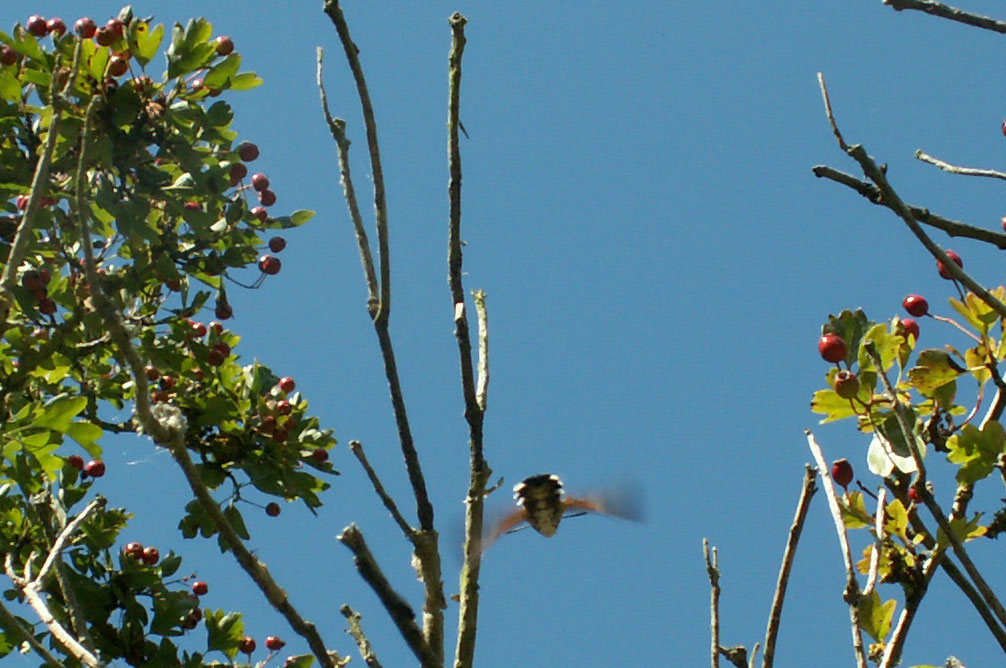 |
|
|
Blood-vein
Moth
|
Hummingbird
Hawk-moth
|
The
Hummingbird Hawk-moth
was
just a speck in the Hawthorn
tops
|
|
21
August 2006
My
first Hummingbird Hawk-moth since
2
July 2006 and only my second of the year
flew around the Buddleia
on the Coastal Link Cyclepath just south
of the Toll Bridge, Old
Shoreham. Another one was seen around the
Buddleia
in the Butterfly Copse next to the Waterworks
Road. Mother of Pearl Moths, Pleuroptya
ruralis, were seen amongst the Stinging
Nettles on lower part of the Pixie Path.
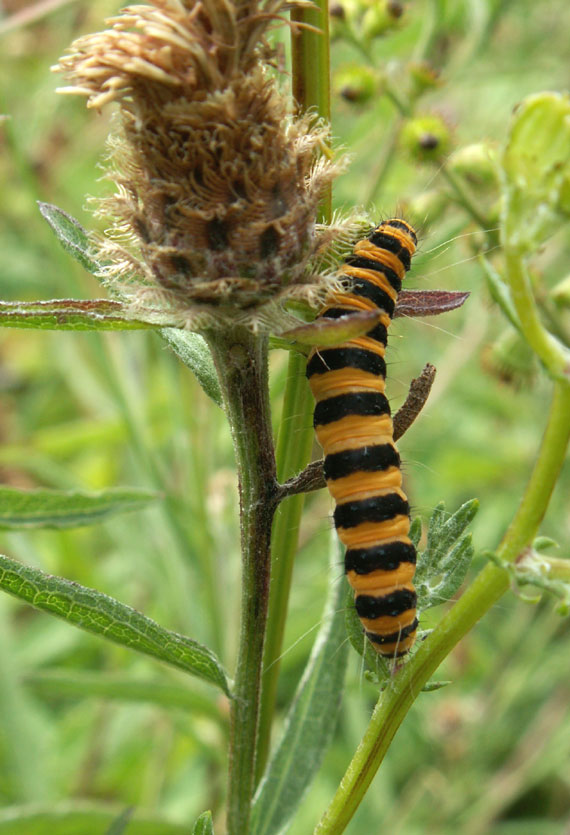 4
August 2006
4
August 2006
Two
Cinnabar
Moth caterpillars were spotted in the
dense upper meadows (north of the upper car park) of
Mill
Hill.
Silver Y Moths
were frequently seen in anything with long grass or shrub shelter. A Treble-bar
Moth was noted in an identical place amongst
the Tor Grass on the lower slopes of Mill
Hill as five days earlier. There were no Burnet
Moths seen, but I did not visit their optimum
location on the more exposed meadows of the upper plateau of Mill Hill.
Yellow
Shell Moths were seen when disturbed in
the hedges and scrub.
Adur
Ragwort
30
July 2006
Silver
Y Moths seemed to be in the undergrowth
everywhere (Slonk Hill and Mill
Hill), but not quite so many as a week before. A pristine Treble-bar
Moth, very bright and clear, was noticed
on the lower slopes of Mill Hill, and
there was a dozen or more smaller moths
disturbed. I did not recall any Burnet Moths.
Butterfly
Report
28
July 2006
There
were a dozen and more Silver Y Moths in
the back garden of the Duke of Wellington
Public House, Shoreham, in a mainly paved
area with a few tubbed garden plants and climbing vegetation, but next
to a large Lime Tree.
 23
July 2006
23
July 2006
At
least, in the late morning it was a bit cooler (after
the thunderstorms of 22
July 2006) mostly
overcast at 24.1 ºC from 11:00 am,
and tolerable for watching Lepidoptera.
There were the large numbers of Silver
Y Moths at a rate of at least five a minute
in the long grass and herbs of Slonk Hill,
and at least three a minute on the meadows on the upper part of Mill
Hill. Six-spot Burnet Moths
were frequently seen and frequently overlooked, and a pale white species
of moth was on and around Nettles at the top of The Drive, Shoreham. Two
of the pyralid micro-moths
Pyrausta
nigrata were noted on the lower
slopes of Mill Hill, but many more have been overlooked.
17
July 2006
6-spot
Burnet Moths were seen frequently on Slonk
Hill south and Mill Hill, and some
Silver
Y Moths .
11
July 2006
6-spot
Burnet Moths and Silver
Y Moths were frequently seen on Slonk
Hill south and Mill Hill. At least
one of the Silver Y Moths
was darker than normal and at first thought of as another species.
Most
smaller moths went unnoticed although the first of the second brood Pyrausta
nigrata was definitely recorded from
the
lower slopes of Mill Hill.
Adur
Pyralids
3 July
2006
A
handful of Cinnabar Moths
and Silver Y Moths were
recorded on both Slonk Hill and the other
A27 road banks as well as the upper meadows of Mill Hill. Scores of
small moths in the undergrowth went unrecorded.
2 July
2006
It
was the warmest day of the year so far as the air temperature measured
29.8 ºC at 4:16 pm. This
was the warmest temperature that I have ever recalled.
It
was a surprise to see the first Hummingbird
Hawk-moth of the year whirring around
my uncut Garden Privet hedge before flying
on. This was much earlier in the year than their normal first appearance.
30
June 2006
Another
"woolly
bear" caterpillar of the Garden
Tiger Moth, Arctia caja,
crawled
across the pavement in Dolphin Road, Shoreham.
 28
June 2006
28
June 2006
A
handful of the first Burnet Moths
of the year were seen on Lancing Ring
meadows and around the dewpond.
On
the Lancing Ring meadows a Burnet Companion
Moth hid amongst the long grass and a
Yellow
Shell Moth was seen on the Coastal
Link Cyclepath south of the Toll
Bridge, Old Shoreham.
In
Shoreham town the first two "woolly
bear" caterpillars of the Garden
Tiger Moth crawled into the open.
Adur
Burnet Moths
23
June 2006
A
handful of Yellow Shell Moths were
seen mostly on Mill Hill, with at least
one of the Slonk Hill Cutting southern path
and there were others I did not note. A
Silver
Y Moth was seen on the Buckingham
Cutting and there were probably others around. Another Oak
Eggar caterpillar was seen near the steps
leading down to the lower slopes of Mill
Hill. |
 |
20
June 2006
There
was a Cinnabar Moth
at the top of the Pixie Path. On the
lower
slopes of Mill Hill over a dozen small
moths were not identified, and there was at least one larger Treble
Bar Moth.
18
June 2006
The
dead flowerhead twitched and moved, and it turned out to be a large moth,
the Eyed Hawk-moth, Smerinthus
ocellata, discovered in a Southwick
garden.
|
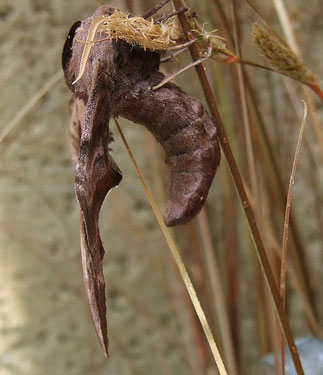 |
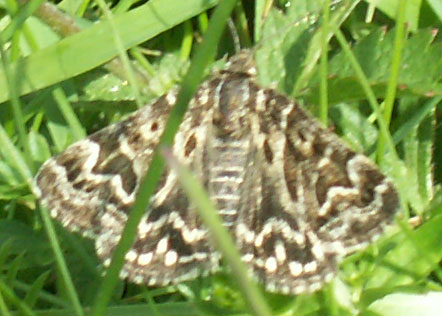 15
June 2006
15
June 2006
A
Silver
Y Moth, a Burnet
Companion, a Treble-Bar
and two pretty Mother Shiptons, Callistege
mi, were all seen on Mill
Hill. A Lackey Moth
caterpillar crawled over the Dogwood scrub on Mill Hill.
11
June 2006
A
fluttering of red on the upper part of the Pixie
Path was my first Cinnabar Moth
of 2006. A Treble-bar
was seen on the the
lower slopes of Mill
Hill. There were frequent large and small moths around, but I found
it too hot to chase and identify
them.
5 June
2006
The
Brown-tailed
Moth
caterpillars are now fully grown and leaving
their silk nests. An isolated one was seen on Slonk
Hill south where there were probably nests.
3
June 2006
This
small moth settled on a Bramble leaf under the shade of the Garden Privet
in my front garden in residential Shoreham.
My
identification is the the 998 Light Brown
Apple Moth Epiphyas
postvittana. |
 |
28
May 2006
On
the
lower slopes of Mill
Hill, the moths noted were two Pyrausta
nigrata and a Yellow
Shell Moth that flew into the Privet.
In
the central Triangle area (clearing amongst
the scrub) of Mill Hill there was a Silver
Y Moth and a Common
Carpet Moth, the latter more inclined
towards the Brambles.
There was also a small brown moth that looked like it is Pyrausta
aurata from its markings, but not
its colour. The alternative species is Pyrausta
purpuralis. The thorax may be shorter
than Pyrausta aurata.
25
May 2006
A
brief walk to the Buckingham Cutting (north
bank) produced a single Silver Y Moth
fluttered amongst the Horseshoe Vetch in
flower.
|
The
hairy
caterpillar (image on the right)
crawling around in my south Shoreham garden
jerked rapidly and fell and got lost in the undergrowth after I briefly
touched it.
I think
this is the caterpillar of the Muslin Moth,
Diaphora
mendica.
It
has been suggested it is the caterpillar of the Ruby
Tiger, Phragmatobia
fuliginosa.
This is a better match.
(I
also much later thought it could be a Buff
Ermine, Spilosoma
lutea.)
A dull
fawn version of the small moth Pyrausta
aurata was seen flitting around in
my front garden.
(?
ID) |
|
 18
May 2006
18
May 2006
A
Silver
Y Moth was seen on the Slonk
Hill Cutting (south bank) at the western end.
16
May 2006
A
Silver
Y Moth was spotted on Shoreham
beach near the Old Fort.
15
May 2006
My
first two Silver Y Moths
of the year flew from Frampton's Field,
Old Shoreham. My first Brimstone Moth
were seen on a brief visit to Mill Hill.
Another Oak Eggar Moth caterpillar
crawled
over a path on the southern part of Mill Hill. Pancalia
micro-moths were above the ridge on Silverweed
flowers.
Adur
Butterfly & Moth List 2006
14
May 2006
An
attractive
Eyed Hawk-moth, Smerinthus
ocellata, was discovered on a Daffodil
in
my garden in Mill Hill Gardens, which was at one time part of Mill
Hill.
Report
by Paul Plumb
British
Lepidoptera (flickr)
10
May 2006
There
was an orange and white moth
that I have not identified and other moths including a Treble-bar
on
the lower slopes of
Mill
Hill as well as hundreds both of the micro-moth Pancaliaand
Pyrausta
nigrata.
A
brown
day-flying moth (or skipper) was seen at the
southern end of the Waterworks Road,
Old Shoreham.
Brown-tailed
Moth Study on Mill Hill
7
May 2006
The
sun was out but it was mild (under 20º
C) in the afternoon. The number of small moths
on the lower slopes of Mill
Hill were notable with both Pyrausta
nigrata
and Pancalia
being common (over 100 each). The third moth is a Longhorn
species (150)
Adela
reaumurella. It was discovered
on the Pixie Path.
| A
note was made of the Brown-tailed Moth,
Euproctis
chrysorrhoea, caterpillars
in their silk cocoons. The caterpillars seem to strip the upper leaves
completely (in the one example noted) but most of the Hawthorn is still
in leaf and not stripped bare. In the nearby Hawthorn without caterpillars,
no damage can be seen. |
 |
|
5 May
2006
A
glimpse of orange-red amongst the Bluebells
was
my first small moth Pyrausta aurata
of the year in a north Shoreham
garden.
4 May
2006
The
small moth Pyrausta nigrata
was frequently (25+) seen on the the lower
slopes of Mill Hill,
2
May 2006
This
very small moth landed on an Alexander leaf
at the southern end of the Waterworks Road,
Old Shoreham. It was only settled for 15 seconds and then it disappeared.
It
is the Nettle-tap Moth, Anthophila
fabriciana.
Adur
Butterfly & Moth List 2006 |
 |
1 May
2006
May
came in with a shower. On the lower
slopes of Mill Hill, Dog
Violets were still abundant and at the
northern end diminutive Ground
Ivy was noted.
Frequent
(10+) small moths Pyrausta
nigrata, seen for the first time this
year, visiting Hawkweeds.
Pancalia
micro-moths were seen and were probably frequent to common, but because
these are very small and hidden, their numbers could not even be guessed
at.
 24
April 2006
24
April 2006
Dog
Violets had now replaced the Sweet
Violets, notably on the lower
slopes of Mill Hill where the first
of the micro-moths Pancalia
were seen amongst the exiguous leaves of the violets
on the bank.
Half
a dozen silken nests of the Brown-tailed
Moths were noticed on Hawthorn trees on
the southern part of Mill Hill.
| 2
March 2006
The
photograph on the right shows another image of the caterpillar
of one of two Xestia
Rustic
Moths. It was discovered in the same place
as the other one, under the discarded chestnut fence strut on the Pixie
Path to Mill Hill. The Square-spot
Rustic Moth Xestia
xanthographa, is the commoner of the two species, but even this
is not clear because of the caterpillar identification problems. |
 |
 10
February 2006
10
February 2006
Underneath
the discarded chestnut fence strut on the Pixie
Path to Mill Hill and illustrated on
the right, the caterpillar is likely to be either one of the (2133) Six-striped
Rustic Moth Xestia
sexstrigata or the (2134) Square-spot
Rustic Moth Xestia
xanthographa, both common species with caterpillars that feed on
a variety of grasses (and other plants if available) during mild winters.
Porter in "Caterpillars of the British Isles" states that larvae of the
two species cannot be separated. The adults
fly around in
August.
Lincolnshire
Moths (including the larva and adult of the Square-spot
Rustic Moth)
27
September 2005
I
spotted an orangey moth
(about Small Heathsize)
flying with rapid wing beats low around my south Lancing garden. I went
out for a closer look. It took particular interest in a warm area at the
base of a Box
hedge where it continued to flutter around. I was then I became aware of
another movement. A Common Frog
was inches away in the low branches and had spotted the moth in close range.
With an agile hop to another branch it caught the moth and swallowed it!!
27
September 2005
The
vegetation had been recently cut and the Pixie
Path was now passable without getting stung.
| The
invertebrate in the is picture on the right is likely to be a pupa of a
moth? |
|
|
25
September 2005
Fluttering
around the top of the pine trees in the twitten
from Ravensbourne Avenue to Buckingham Park in north Shoreham there was
a small (the size of a Small
Heath) orange or brown butterfly (possibly
a moth?) that was not identified. This was
probably a male
2026
Vapourer Moth,
Orgyia
antiqua.
(ID not confirmed, just a
best guess.)
Nettle
Feeders (UK Moths)
4 September
2005
At
about dusk we watched as a Hummingbird
Hawk-moth flew close to the house wall
just below the level of the guttering, it then landed and crawled into
a crack in the rendering, one of the points where the wall cavities were
filled and cemented over. (TQ 186 044).
|
|
4
September 2005
There are two species of
Treble Bar. I think this is most likely to be the Common Treble-bar
Moth,
Aplocera
plagiata sheltering amongst the Privet on
the lower slopes of Mill
Hill. |
|
2 September
2005
A
Hummingbird
Hawk-moth visited the Lavenderin
my south Lancing garden (TQ 186 044).
30
August 2005
A
dozen Pyrausta aurata moths
were lively amongst the herbs and short grass on the the lower
slopes of Mill Hill. (NB:
to make sure these are not Pyrausta purpuralis?)
23
August 2005
A
damaged and worn
Pyrausta
aurata moth rested on a Scentless
Mayweed on the Coastal
Link Cyclepath.
22
August 2005
The
Water
Mint was flowering in my front garden
and two of the
small pyralid Pyrausta
aurata moth were flitting around.
21
August 2005
 |
12
August 2005
The
colourful caterpillar in my south Lancing garden was that of the dull (2284)
Grey
Dagger Moth,
Acronicta
psi.
A Hummingbird
Hawk-moth was also seen in the garden.
Lancing
Moths
More
Images |
 |
7
August 2005
The
first (1984) Hummingbird Hawk-moth,
Macroglossum
stellatarum, of the year landed in a Shoreham garden:
it flew off rapidly when tickled. It appeared to have chosen a rockery
as a roosting place.
6-spot
Burnet Moths (12+) flew over Mill
Hill. |
25
July 2005
On
passage through the Slonk
Hill Cutting southern path, there were
two Yellow Shell Moths that
quickly fluttered into the bushes.
22
July 2005
There
were more than twenty 6-spot Burnet Moths
on
Mill
Hill and I was not paying much attention to them and there were probably
many more but less than five days earlier. It seem that some of the moths
appeared to have only five spots on each wing, but it looks like the last
spot could have faded?. A Carpet Moth was
disturbed on Slonk Hill. There was also what
looked like a common species of moth called the Shaded
Broad-bar,
Scotopteryx
chenopodiata.
17
July 2005
6-spot
Burnet Moths were common with a total
of over a hundred seen on Slonk Hill and Mill
Hill mostly but present on wasteland everywhere. There was a
distinctive small white Ermine moth
and at least one larger Silver Y
on the Slonk Hill Cutting, at least one small Pyrausta
nigrata on the lower slopes of Mill
Hill. Many small moths went unrecorded.
10
July 2005
A
short walk to the top of the Drive and along the Slonk
Hill Cutting produced at least 15, probably many more 6-spotted
Burnet Moths.
Trefoil
Feeders (UK Moths)
8 July
2005
Burnet
Moths were flying over Mill
Hill and emerging from their cocoons. Most seemed to be Six-spot
Burnets, and some seem to have faded their
last spot, and one could have been a 5-spotted
one.
There
was a Magpie Moth amongst
the Stinging Nettles
on the Waterworks Road and a Yellow
Shell Moth on the Pixie
Path. On the lower slopes of Mill
Hill, at least one second brood micro-moth Pyrausta
nigrata nectared on Wild
Thyme.
There was a similarly sized moth next to it, but
it flew away before I could confirm its identity (1365
Pyrausta
despicata
seems most likely).
3 July
2005
Burnet
Moth (probable) 1 Pixie Path, it did not settle and I am identifying
it by its unreliable flight.
Cinnabar
Moth (probable) 2 southern part of Mill Hill, south of
the Reservoir, and with a more laboured flight as though it had been disturbed.
Neither
of these identifications could be confirmed and they cannot be regarded
as bona fide biological records.
2 July
2005
Overcast
but without the rain, two Magpie Moths
disturbed
amongst the Stinging Nettles
in the Butterfly Copse next to the Waterworks
Road.
29
June 2005
On
the rough ground south of the Elm Corridor in New Monks Farm (west) a dozen
of the first Burnet Moths
of the year were first recorded. However, this was just the first time
I had seen them settled and some of the earlier Cinnabar
Moths reported were Burnets
(the text entries have now been changed). They
were most likely to have been the
Narrow-bordered
Five-spot Burnet Moth,
Zygaena lonicerae.
Adur
Burnet Moths
24
June 2005
Moths:
Treble
Bar (lower slopes), Silver
Y (herbs north of the upper car park),
Burnet
(Slonk
Hill Cutting, south bank).
23
June 2005
There
was a Burnet Moth
(originally identified by mistake as a Cinnabar
Moth) just north of the cemetery near
Lancing Ring.
22
June 2005
By
mid-afternoon 3:00 pm
onwards most of the butterflies seemed already
have gone to roost in the heat (27.3 ºC
at 4:30 pm).
Burnet
Moth 1 (Pixie
Path) This is only a probable first sighting of the year.
Common
Heath Moth 1 (Lower
slopes of Mill Hill)
18
June 2005
Moths:
Cinnabar
3* (Mill Hill, middle scrub) (*Settled,
100% ID), Yellow Shell (Copse at the
top of Mill Hill)
17
June 2005
1.
Micro-moth
that settled on Teasel during the day (Garden in
Corbyn Crescent)
985
Carnation Tortrix Cacoecimorpha
pronubana
ID confirmed by Angus Tyner
on UK Moths Yahoo Group
2.
Micro-moth
that
fluttered around the pond plants during the day (Garden in Corbyn Crescent)
1076
Celypha
lacunana
ID confirmed by Angus Tyner
on UK Moths Yahoo Group
3.
1682
Blood-vein,
Timandra
comae (Spring
Dyke)
4.
Large
Skipper (usually classed as a butterfly)
(Coastal Link Cyclepath)
| Burnet
Companion Moths were recorded on Slonk
Hill Cutting southern bank and the Coastal Link Cyclepath, total about
four. The photograph on the right, nectaring on Bird's
Foot Trefoil, shows the abdomen clearly. |
 |
13
June 2005
A
Burnet
Companion and at least one Treblebar
Moth were seen on the lower
slopes of Mill Hill.
A
Magpie
Moth appeared at Mash
Barn, Lancing.
10
June 2005
A
"woolly
bear" caterpillar of the Garden Tiger
Moth was seen in my Shoreham garden.
| 8
June 2005
Lackey
Moth
Caterpillar
|
|
7 June
2005
Day-flying
or nocturnal moths disturbed during the day:
Slonk
Hill Cutting: Burnet Companion Moth
(2+),
and the longhorn moth Nemophora
degeerella.
Lower
slopes of Mill Hill: 3+ Treble-bar
Moths disturbed.
Dovecote
Bank: a Carpet Moth
settled.
The
small moth species was a male 148 Nemophora
degeerella.
The long antennae of the male can be seen if you
click on the central photograph. It was spotted
on the south bank of the Slonk Hill Cutting.
22
May 2005
Moths
on the Slonk Hill north bank and Mill
Hill included a handful of Treble-bars,
one
Cinnabar Moth
(lower Mill Hill), at least one Burnet
Companion (upper Mill Hill), a
handful of Silver Y Moths, and at least two unidentified species
of larger moth, and lots of small moths as well. The first Pyrausta
aurata moth
of the year was seen in a Shoreham
garden,
Brown-tailed
Moth caterpillars
were
noted on the north bank of the Slonk Hill Cutting, especially their nests
in a Hawthorn Tree, south-west of Buckingham Barn.
 |
22
May 2005
The
first Pyrausta aurata moth
of the year was seen in a Shoreham garden. |
 15
May 2005
15
May 2005
After
buffeting by the gales and strong breezes during the last week, the sun
came out and the butterflies, skippers and
moths
were now common (over 100, about 60 leps on the lower
slopes of Mill Hill). Moths included
pale Treble-bars
(2+), Burnet Companion, Euclidea
glyphica (2+), Pyrausta
nigrata (not counted), plus an unidentified
medium-sized species near the gate to Old Erringham, and a micro-moth Incurvaria
(image
right).
6 May
2005
The
small moth 2470 Small
Purple-barred Moth Phytometra
viridaria was recorded for the first time on the lower
slopes of Mill Hill, although it has
been seen before.
Also the
Burnet
Companion Moth, Euclidia
glyphica.
Additional
record by Lawrie Keen on
Mill Hill:
Cinnabar
Moth 2.
Butterfly
& Moth Report
5 May
2005

This
attractive Angle Shades Moth,
Phlogophora
meticulosa, was discovered in Lancing
Manor allotments.
1
May 2005
Small
moths were common on the Shoreham
Bank with over 50 Pyrausta
nigrata, lots of micro-moths that
escaped identification and quite a few Pyrausta
despicata. The first Cinnabar
Moth of the year was seen on the lower
slopes.
29
April 2005
On
the
lower slopes of
Mill
Hill
During
the fifteen minutes stay, I spotted what appeared to be at least
two different Pyrausta Moths,
including Pyrausta nigrata.
I have now provisionally identified the new species as 1365
Pyrausta
despicata.
The
2470 Small
Purple-barred Moth Phytometra
viridaria was present as well.
There
was a Common Heath Moth,
Ematurga
atomaria,* as well, which settled
with its wings expanded.
In Hampshire,
it is the yellower form of this moth that is found on the chalk downland.
ThePancalia
micro-moths were very frequently (50+) seen on Daisies
and
as they were very small, most were overlooked and they were expected to
be common (100+) over the Shoreham Bank.
These Pancalia
micro-moths have a white band on their antennae which indicates the commonest
species, the Violet Cosmet,
Pancalia
leuwenhoekella.
What's
Flying Tonight (Moths)
21
April 2005
Brown-tail
Moth Pest Control Information File
1 April
2005
No
butterflies were seen in the weak sunshine in the late afternoon on Mill
Hill or in Old Shoreham on the cyclepath
south of the Toll Bridge.
There
was a moth resting on the fence in the Butterfly
Copse as photographed above. It assume
that is a nocturnal moth resting up during the day as it did not fly away
when poked, but dropped to the ground. This moth is the Early
Grey, Xylocampa
areola.
The yellowish-brown larvae feed on Honeysuckle,
Lonicera.
Pre-2005
Not
collated yet
16
August 2004
The
Flounced
Rustic, Luperina
testacea, was photographed in Shoreham,
probably in the town. |
 |
25 July
2004
All
from
Slonk Hill south road embankment.
The
first species could be the Shaded Broad-bar,
Scotopteryx
chenopodiata. (ID not confirmed)
The
second one is a different moth, but it could be the same species. It was
taken on 22 July 2005.
.
The
one on the far right could be the 2352
Dusky
Sallow, Eremobia
ochroleuca
3
September 2004
Ray
Hamblett's south Lancing garden (TQ
186 044) with best view and highlight of the
day of a Hummingbird
Hawk-moth visiting the purple Buddleia
in the same back garden. The furry caterpillar
from the same garden looks like that of the Muslin Moth, Diaphora
mendica, (not confirmed). It is reported to eat various low
lying herbs including dandelions, chickweeds, docks and plantains.
What
is that Caterpillar?
13
May 2004
The
Horseshoe
Vetch is now flowering over almost its
complete range on the lower slopes of Mill
Hill, including the southern end of the steeper slopes that was not
showing at all a week ago and could not be seen from a distance three days
ago.
|
Treble-bar
Moth
The
food plant of the caterpillar is St. John's
Wort which occurs as isolated plants on the
the lower slopes of Mill
Hill, with a larger patch on the middle slopes as well
|
 |
 |
 |

|
Burnet
Moth larva
18
June 2004
|
Burnet Moth emerging
20
July 2004
|
Burnet
Moth
Late
July 2000
|
29
June 2004
There
was a Burnet Moth with
a striking blue striped abdomen (below right).
This was originally thought to be the Narrow-bordered
Five-Spot Burnet Moth,
Zygaena
lonicerae.
However, it was
perhaps even more likely to be a late flyer of the Five-Spot
Burnet Moth, Zygaena
trifolii ssp. palustrella. A
Small
Skipper was also recorded.
ID
Message from Trevor Boyd on UK Leps
Adur
Burnet Moths
Adur
Skippers
Burnet
Moths
 22
June 2004
22
June 2004
The
gales
may have brought this caterpillar in on piece of flying vegetation. It
hid down in the long grass and curled up when disturbed. These are known
as 'Woolly Bears',
the larvae of the Garden Tiger Moth, Arctia
caja. It was recorded in a
small
front garden in Corbyn Crescent, Shoreham. (TQ
224 055)
6
August 2003

The
pretty little day-flying pyralid moth known as Pyrausta
aurata, were attracted to their caterpillar food plant Water
Mint in Ray
Hamblett's south Lancing garden.
4 October
2004

Pyrausta
nigrata
Shoreham
Bank
27
April 2004
Emperor
Moth

At Spring
Dyke
9 April
2004

The
splendidly coloured male Emperor
Moth,
Pavonia
pavonia, rested among the grasses at the top of the lower slopes
of
Mill Hill. It was discovered by Katherine
Hamblett and Tacita French. The feeding plants
for the caterpillars varies according to location: it has been recorded
on
Bramble, Hawthorn,
Wild
Privet and many other plants.
(The females of this moth are grey coloured.)
More
Information on the Emperor Moth
Lancing
Nature
Adur
Butterflies
8
August 2003
18
September 2001
A
pure white moth
buzzed around the white beach huts by Widewater
Lagoon (TQ 204 042).
This was likely to be a Brown-tailed Moth
adult (but this was not confirmed).
 6
July 2000
6
July 2000
A
Common
Emerald Moth, Hemithea aestivaria, entered my house in South
Lancing. The wingspan is about 28 mm. This is the commonest of the emerald
moths, distinguished from the Large Emerald because of its wavy lines.
Report by Ray
Hamblett
UK
Moths
UK
Moths Thumbnail Index
Irish
Moths: Foodplants
What's
Flying Tonight (Moths)
UK
Moths Yahoo Group
Day
Flying Moths
Observations
of some of the smaller Moths in the Adur district area
Moths
and Butterflies of Europe
Regional:
Cornish
Moths Selection
Suffolk
Moth Group
Some
Moths from Lincolnshire
Moths
(by Colin Barnes) from Oxfordshire
Lancing
Butterflies & Moths (by Ray Hamblett)
British
Lepidoptera (flickr)
.jpg)
.jpg)




.jpg)
























 9
June 2014
9
June 2014




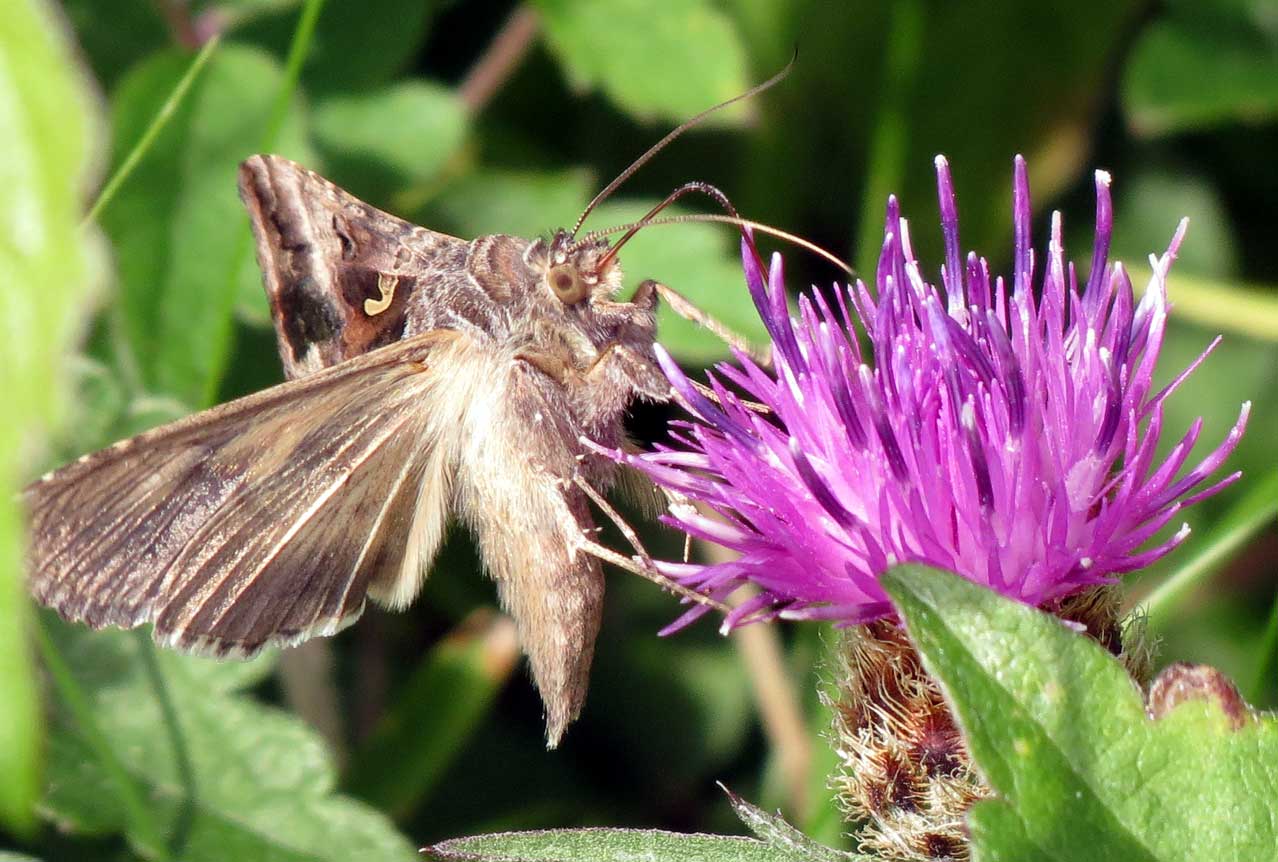
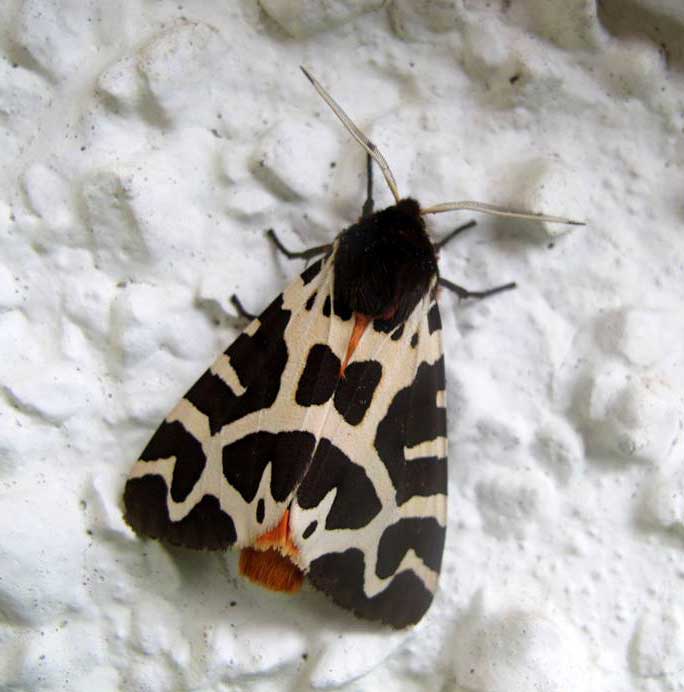


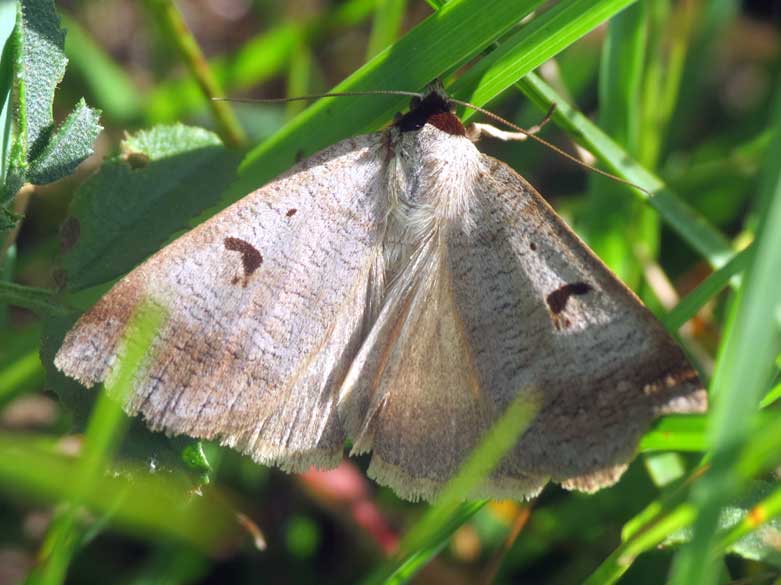





 31
July 2012
31
July 2012








.jpg)
.jpg)





















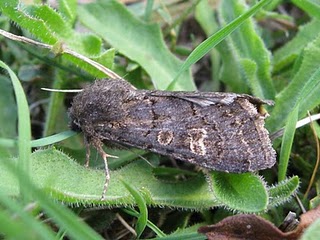
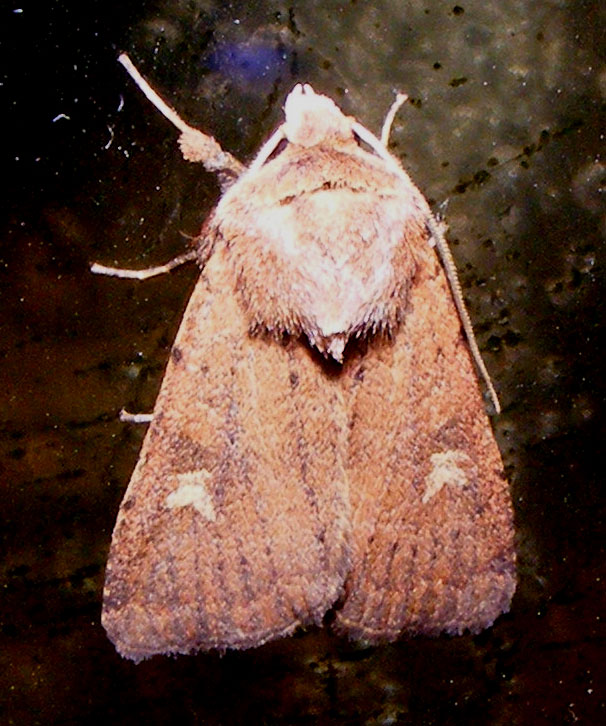




 21
June 2010
21
June 2010

 My
first Silver Y Moth
of the year was seen by the Reservoir
on Mill Hill and another one the lower
slopes where I saw at least one Burnet
Companion Moth for the first time this
year. The small pyralid
moth
Pyrausta nigrata was seen, but I did
not spot any of the other pyralids. In the scrub there was my first Carpet
Moth of the year. I have identified this carpet
moth as the Purple Bar,
Cosmorhoe
ocellata. This is my first record
of this common species.
My
first Silver Y Moth
of the year was seen by the Reservoir
on Mill Hill and another one the lower
slopes where I saw at least one Burnet
Companion Moth for the first time this
year. The small pyralid
moth
Pyrausta nigrata was seen, but I did
not spot any of the other pyralids. In the scrub there was my first Carpet
Moth of the year. I have identified this carpet
moth as the Purple Bar,
Cosmorhoe
ocellata. This is my first record
of this common species.


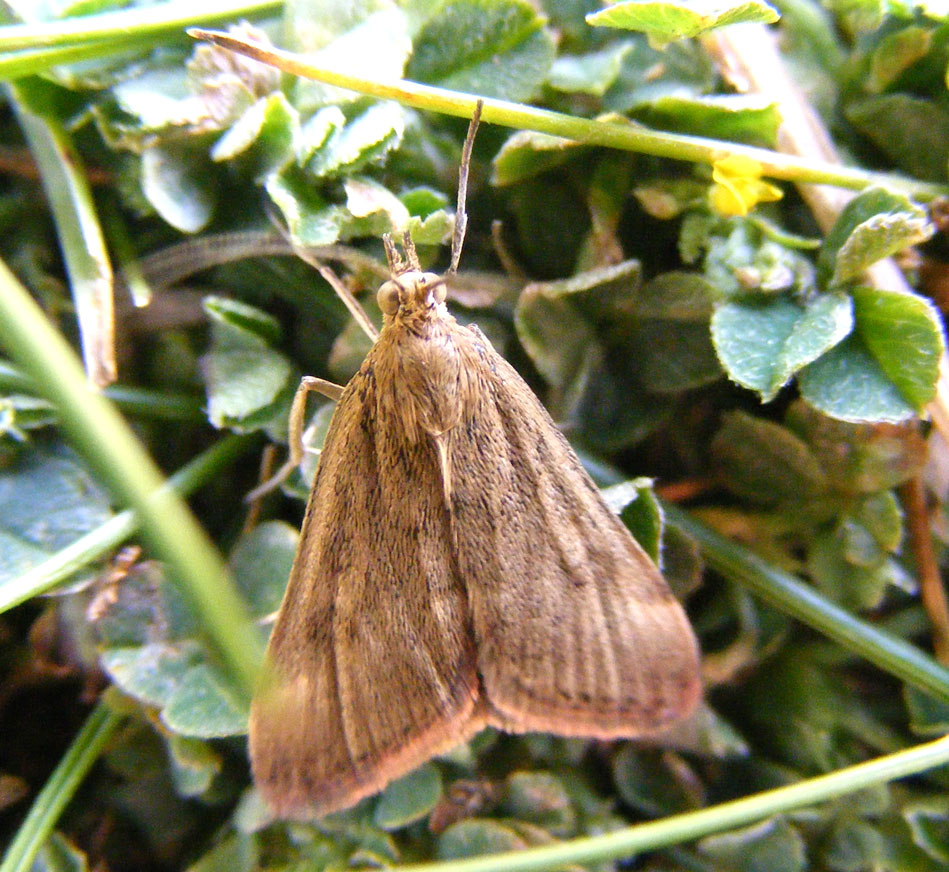



























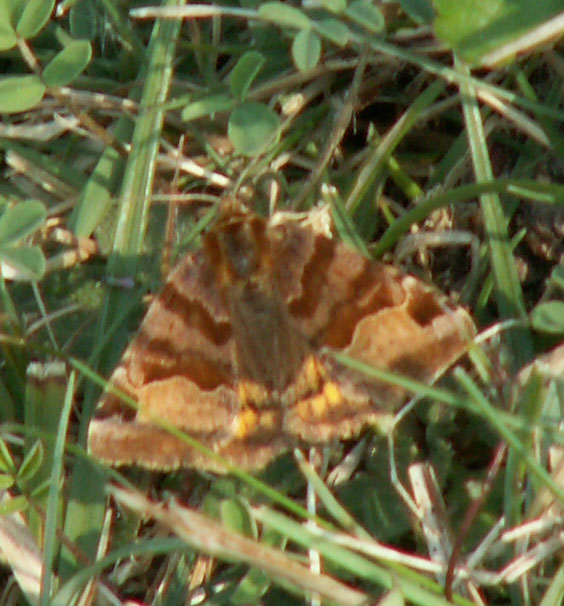










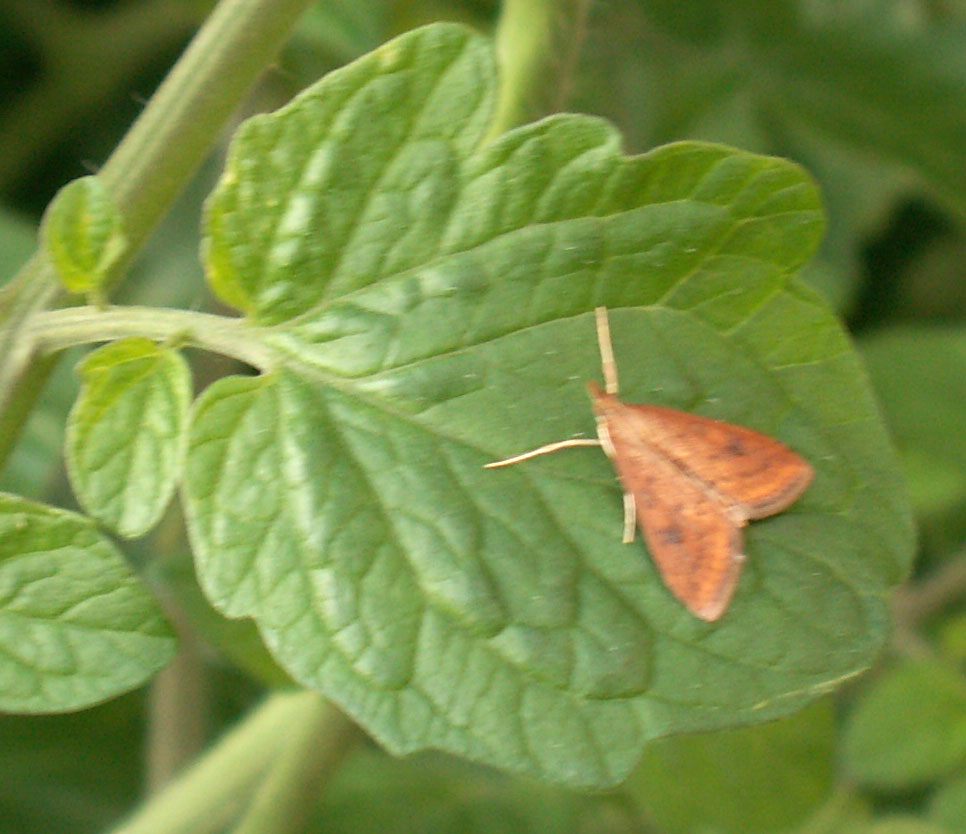




 4
August 2006
4
August 2006




 28
June 2006
28
June 2006













